-
Plant Name & Description
Botantical Name
-
Hair Garlic Allium vineale 'Hair'
Bulbous, clump-forming relative of the wild garlic. Red-purple centers are covered with long, twisty hair-like green petals.
-
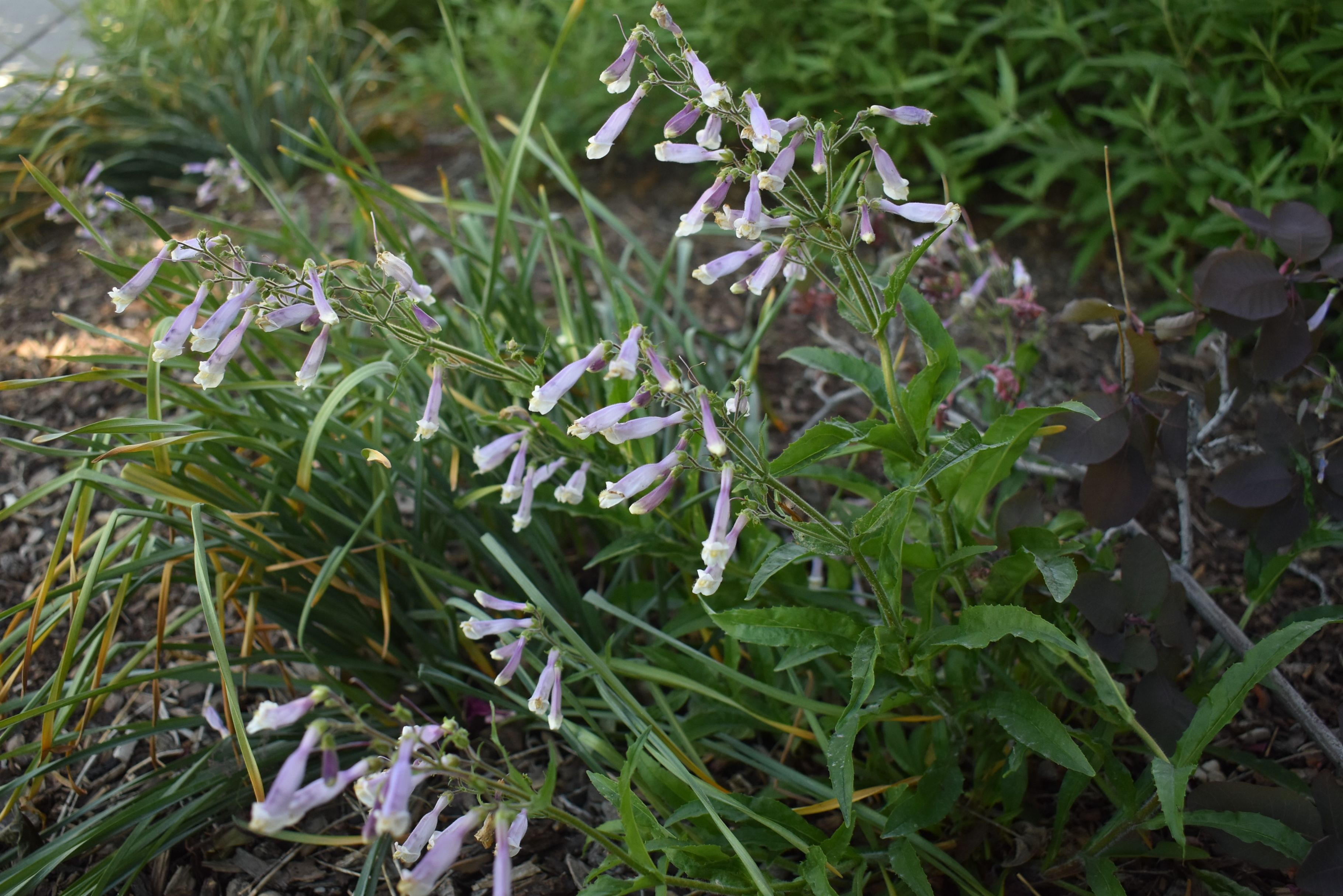
Hairy Penstemon Penstemon hirsutus
A purple flowering penstemon that is adaptable to many environments, making it nearly effortless to grow. It can handle full sun to full shade and thrives in both moist and dry conditions. The subtle hairy texture along the stems sets it apart from other Penstemons and is what led to its name. This perennial hosts bumblebees, hummingbirds and larva for several Checkerspot butterfly species.
-

Hale Haven Dwarf Peach Prunus persica 'Hale Haven'
This high-yielding dwarf peach tree is a hybrid of J.H Hale and South Haven. Bears numerous pink flowers in spring leading to large yellow freestone peaches with red blushed skin. The peaches have firm flesh that resists bruising and is ideal for canning and freezing. Needs 6-8 hours of sunlight daily to ripen. Green lance shaped leaves also provide some ornamental appeal without the fruit. Not tolerant of drought. Self-pollinating.
-
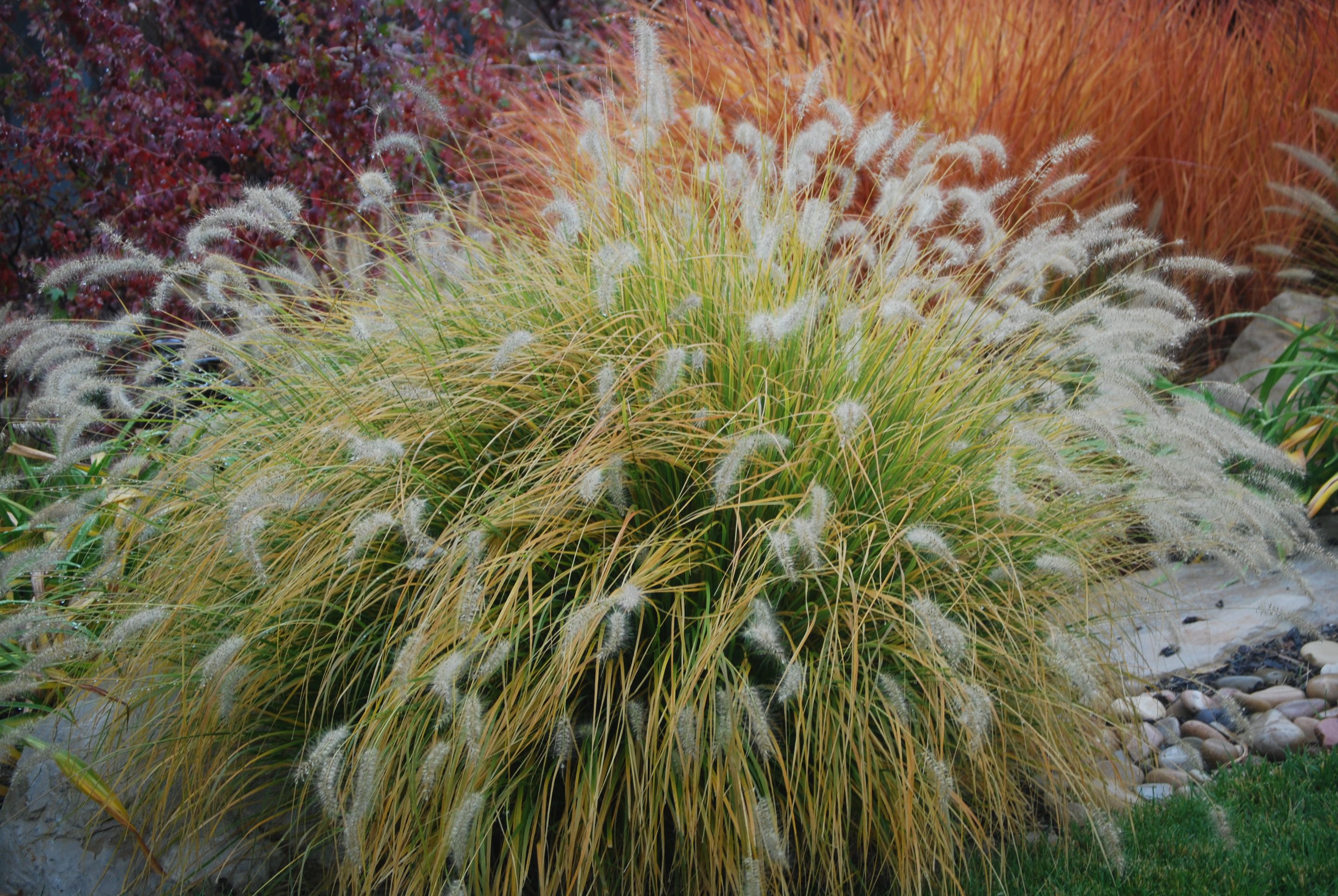
Hameln Dwarf Fountain Grass Pennisetum alopecuroides 'Hameln'
Dense, clump-forming, perennial grass with foxtail-like inflorescences. Has narrow, mid-green leaves up to half-an-inch wide. Tiny creamy-white flowers are begin blooming in June. Very attractive foxtails last into fall. Prefers full sun. Moderately drought tolerant. Shorter than average species height.
-
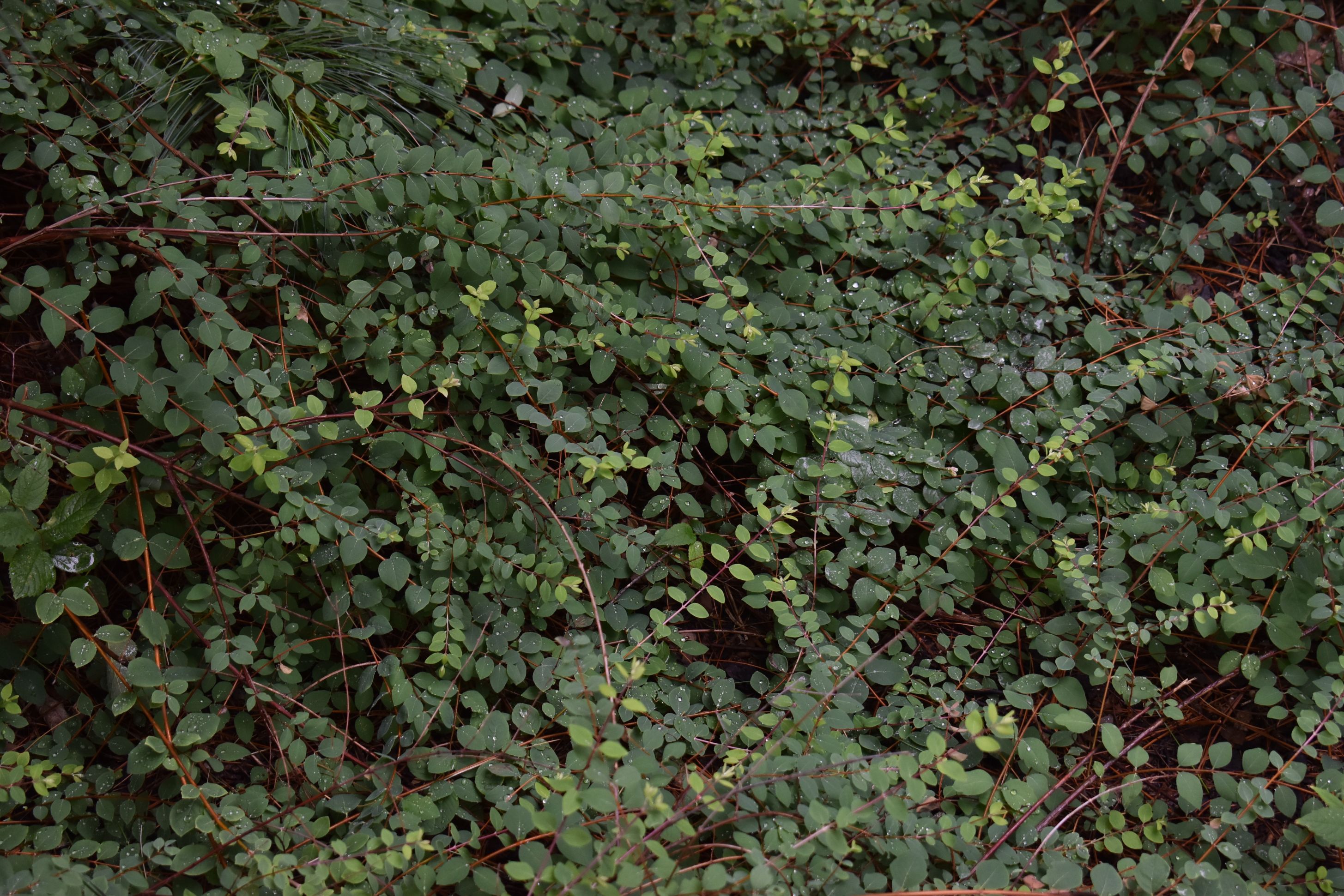
Hancock Coralberry Symphoricarpos x chenaultii 'Hancock'
Low-growing, spreading shrub with arching branches. Branches do not root where they touch the ground. Pink-white blossoms appear in early summer giving way to pink berries which mature in autumn. Dark green leaves are oval and hairy underneath.
-
Hardy Geranium Geranium spp.
This is a clumping, sprawling herbaceous perennial. It takes little water and does not require much fertilization. Plants will rebloom if cut down to the ground after first blooms have faded.
-
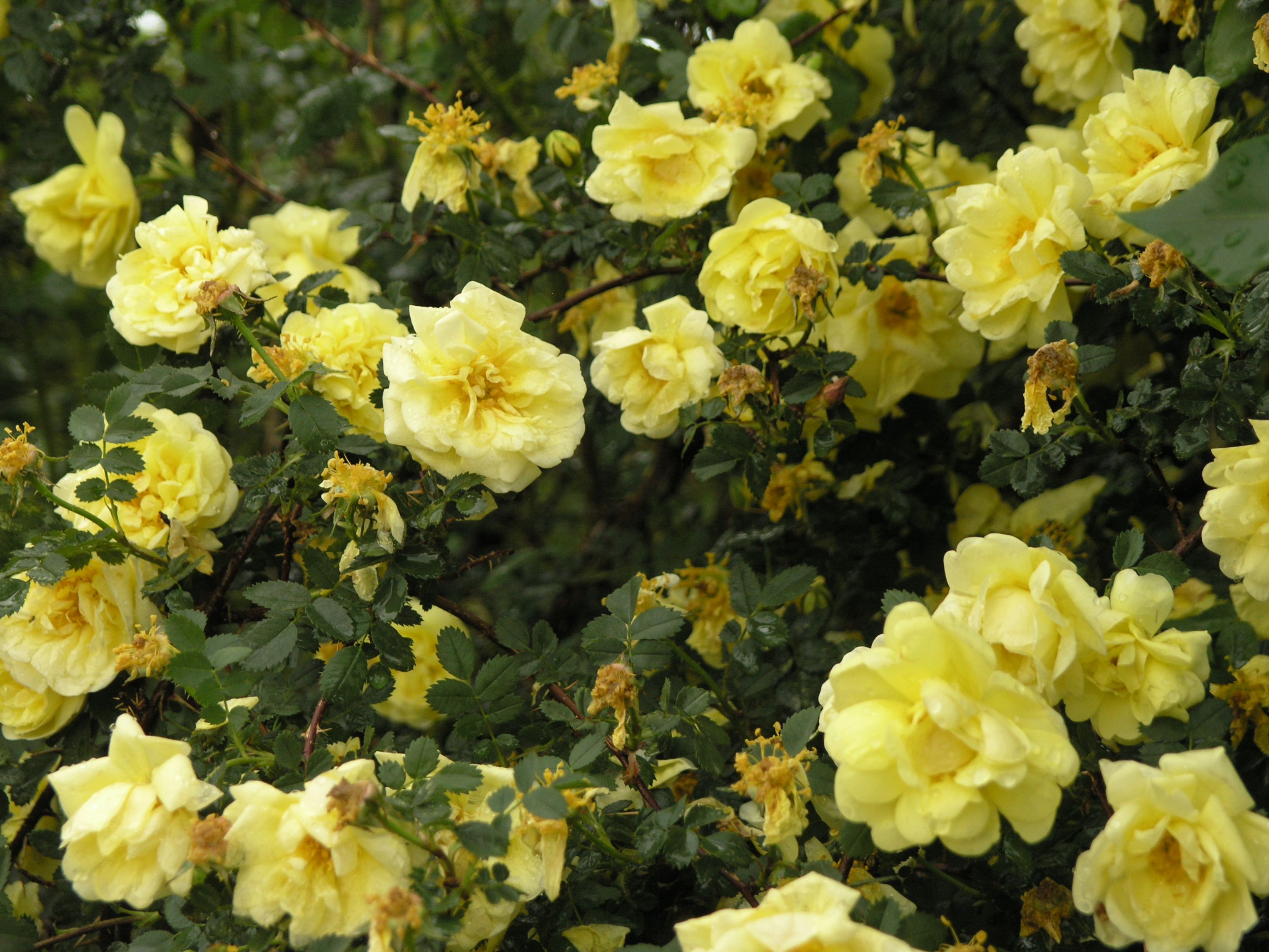
Harison's Yellow Rose Rosa x harisonii 'Harison's Yellow'
Suckering shrubby rose also known as the "Yellow Rose of Texas." Mid-green fern-like leaves grow on spiny stems. Spring brings cup-shaped, semi-double, bright yellow fragrant flowers up to 2" in diameter. Can be very aggressive. Plant in well-drained soils. Tolerates alkaline soils and drought.
-
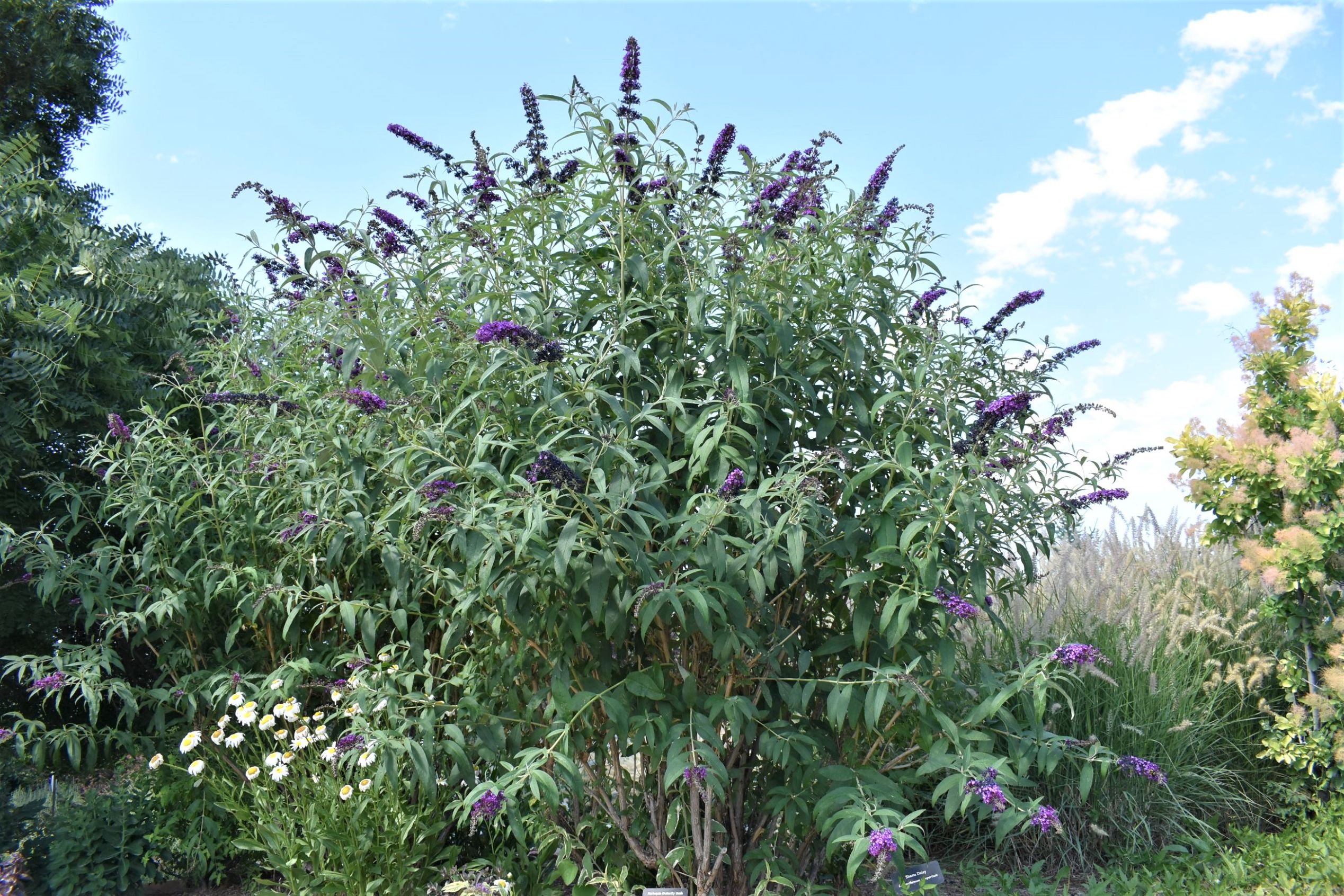
Harlequin Butterfly Bush Buddleja davidii 'Harlequin'
Beautiful medium to large shrub flowering shrub. Can be pruned back to desired height each year, even to the ground if desired. Once established, this plant is tolerant of many conditions. Attracts butterflies and bees. In addition to dark red-purple blooms, the leaves of this variety are variegated.
-
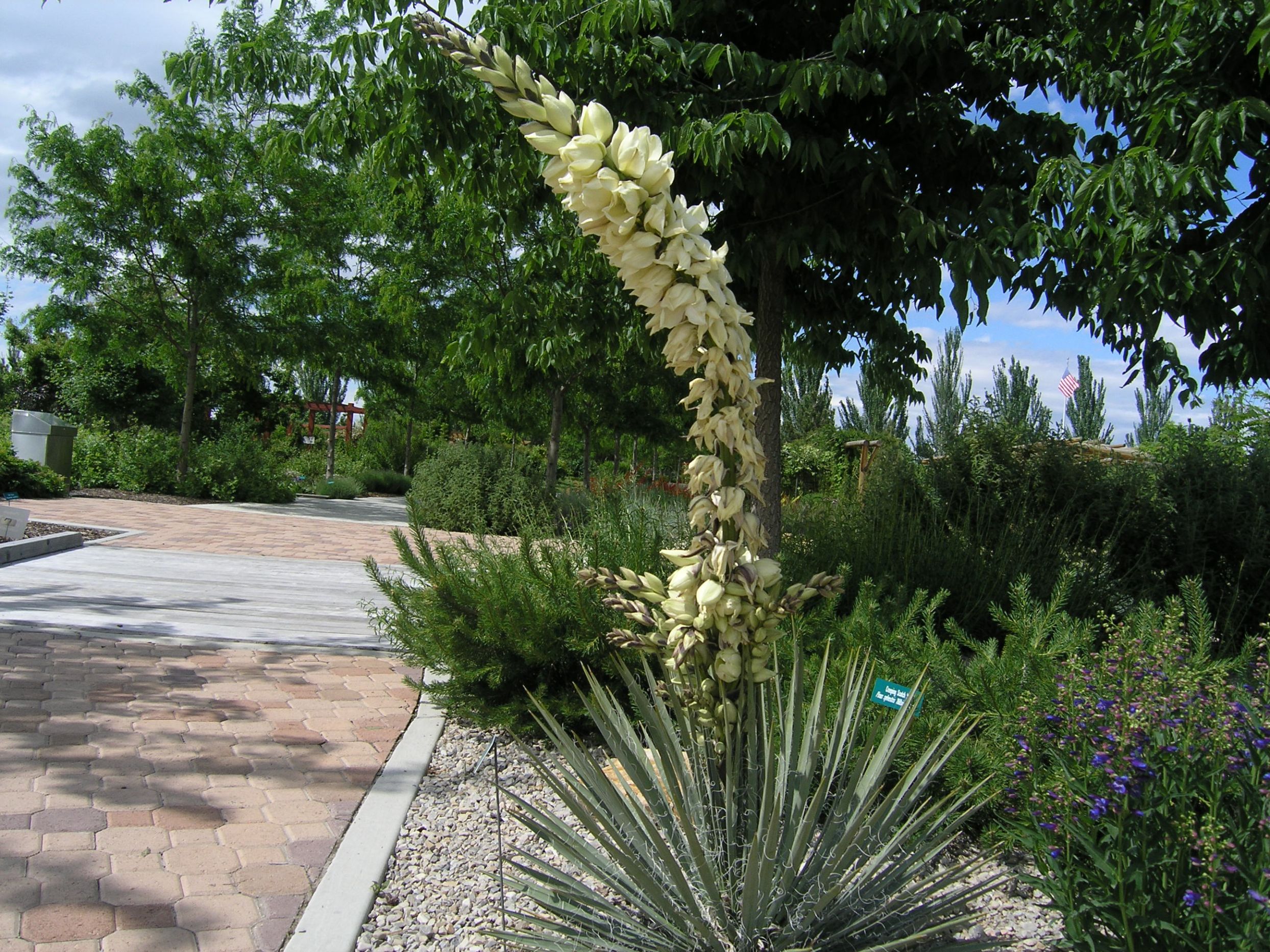
Harriman Yucca Yucca harrimaniae
Upright-growing evergreen shrub. Thick, narrow blue-green leaves have sharp tips and should be planted away from high traffic areas. Clusters of cream-colored flowers tinged with purple grow on tall stems above the plants in early summer. Needs no irrigation once established.
-
Heartleaf Bergenia Bergenia cordifolia
Short, clump-forming perennial often grown for its attractive rosettes of large, glossy-green, heart-shaped leaves that turn reddish-bronze in the winter. Dense clusters of small-pink flowers bloom in spring. Tolerates many soil types but needs consistent water to grow well.
-
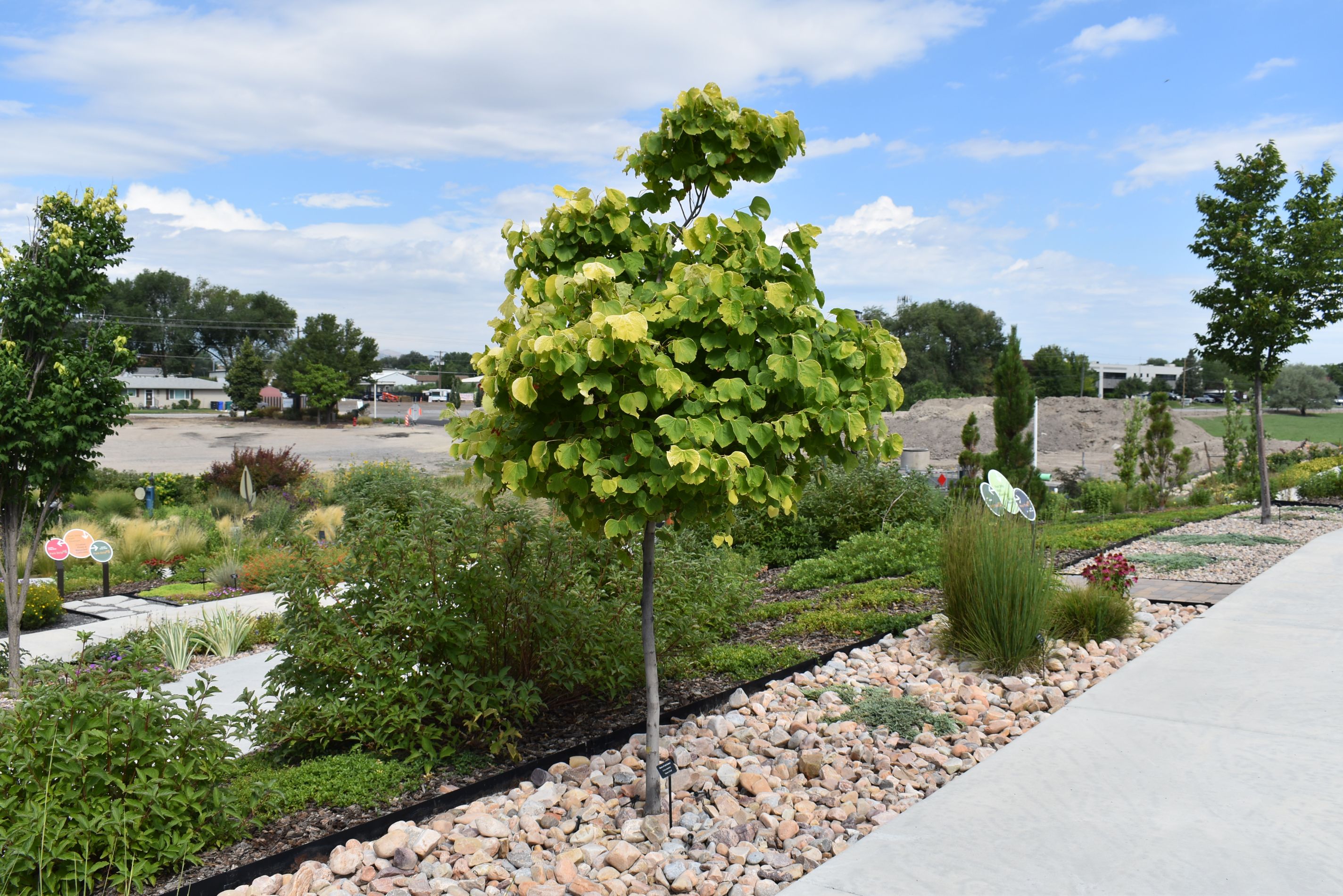
Hearts of Gold Redbud Cercis canadensis 'Hearts of Gold'
This Redbud will add a lot of interest to any landscape. Early spring brings lavender-purple blossoms that emerge on bare branches. Then, large heart-shaped leaves emerge orange-red, mature to a brilliant golden yellow and gradually fade to a pale, yellowish-green as summer approaches. The unique foliage alone makes this Redbud a perfect specimen plant or informal hedge.
-

Heavenly Blue Bluebeard Caryopteris x clandonensis 'Heavenly Blue'
Medium deciduous shrub often best treated as a perennial along the Wasatch Front. This plant is marginally hardy and will die to the ground during hard winters, but will easily grow back from its roots. Produces narrow, gray-green leaves with clusters of deep blue flowers. Flowers during the summers.
-
Heavy Metal Switch Grass Panicum virgatum 'Heavy Metal'
Clump-forming, warm season, ornamental grass. Long, slender, metallic-blue leaves form a dense columnar clump but may flop in overly fertile soils or too much shade. Fine textured, pink-tinged seed heads appear in fall and provide excellent winter interest if left uncut. May reseed. The species is native from Utah to the east coast.
-
Hedge Maple Acer campestre
Medium-sized deciduous tree with highly variable shape. Thin branches grow profusely with 5-lobed leaves that turn bright yellow in the fall. Grows well in dry sites but needs some water to maintain vigor. The common name refers to its tolerance of severe pruning such as hedging. Makes an excellent street tree but prefers some protection from the wind. Requires pruning early on to develop a desirable shape.
-
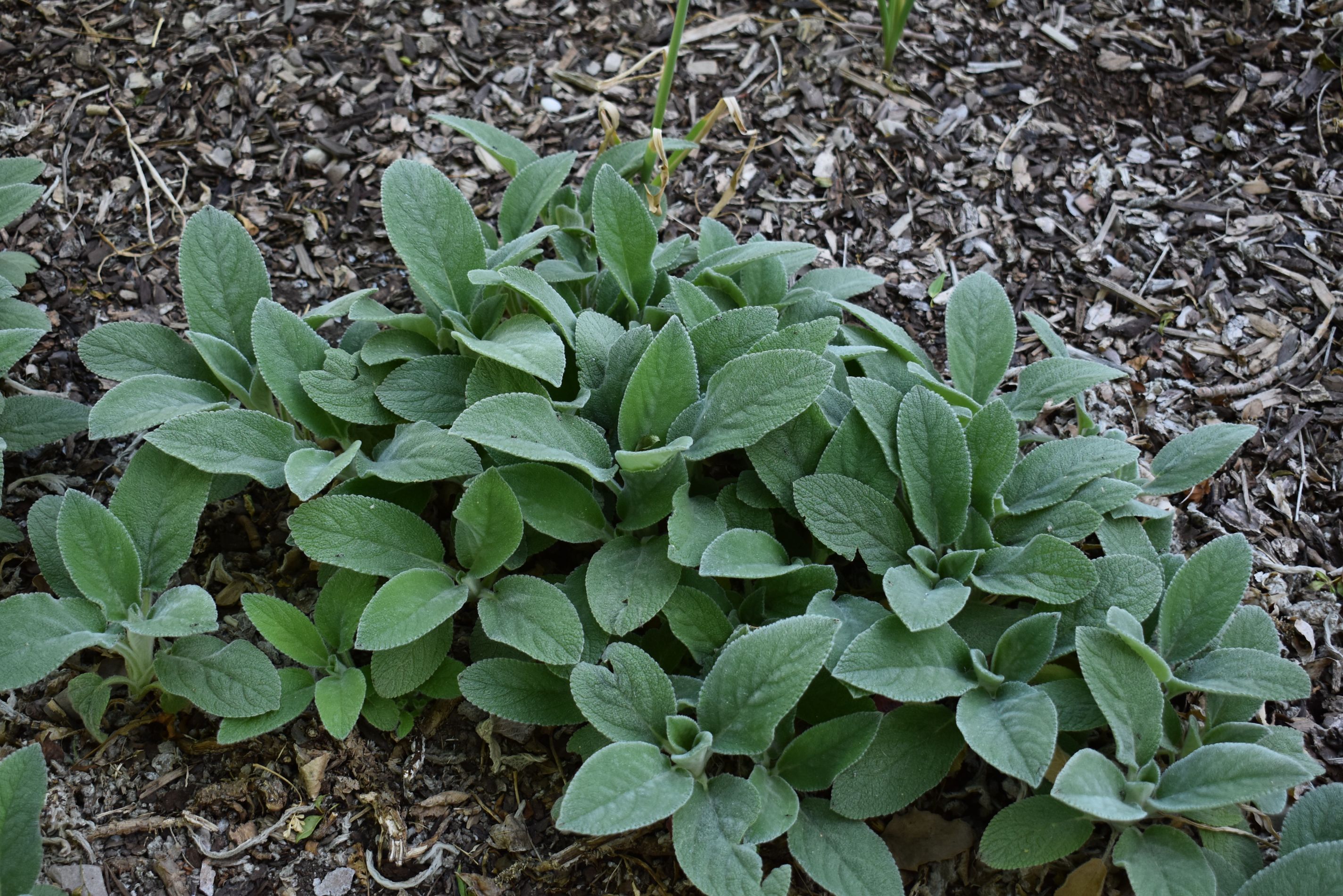
Helen von Stein Lamb's Ear Stachys byzantina 'Helen von Stein'
Dense, mat-forming woolly gray-green perennial. These semi-evergreen leaves are hairy, soft and resemble the ears of a lamb, hence the name. This cultivar rarely flowers. Can form a dense groundcover. Tolerates some drought and needs well-drained soils. Makes a great addition to rock gardens and works well as an accent plant.
-
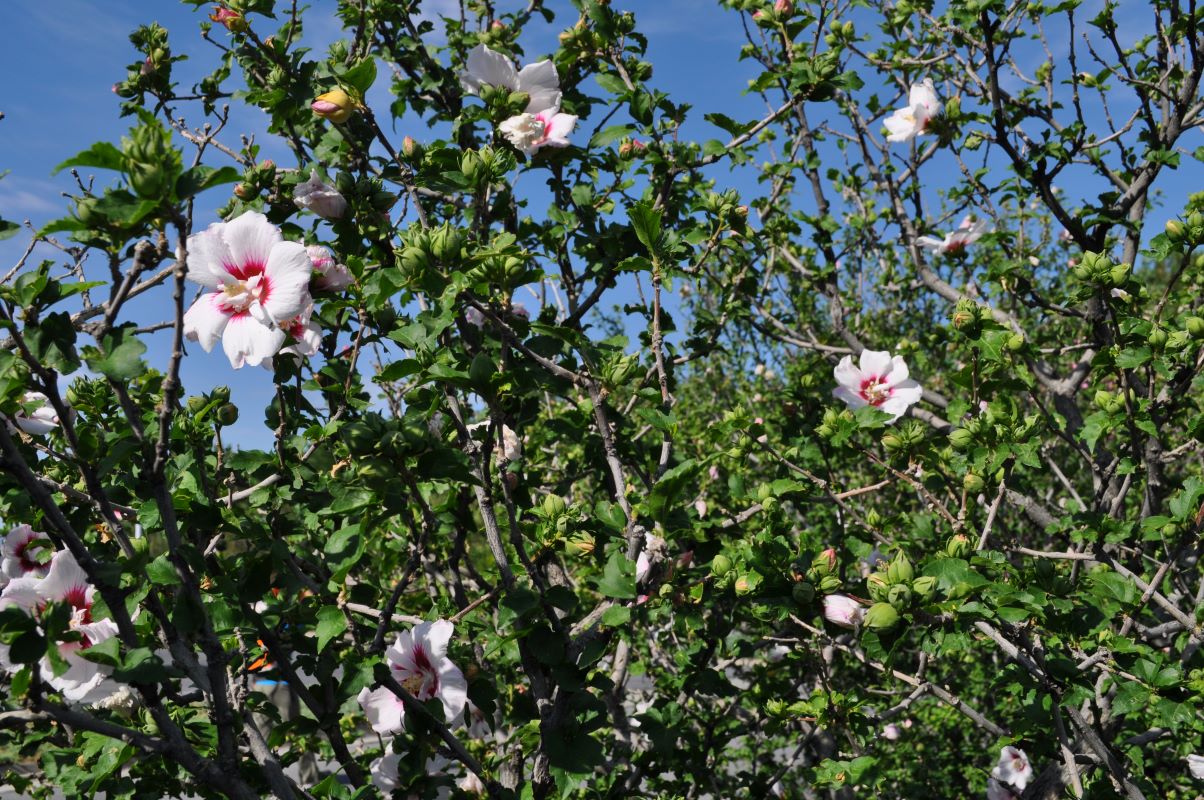
Helene Rose of Sharon Hibiscus syriacus 'Helene'
A vigorous flowering shrub, the hibiscus grows with dense multiple stems. It grows upright and can make a good hedge. Summer brings numerous showy, pure-white, five-petaled flowers with dark red to purple eyes. The coarsely-toothed leaves provide a nice backdrop for the attractive flowers. It is tolerant of heat, drought, and poor soils but prefers fertile soils with moderate amounts of water.
-
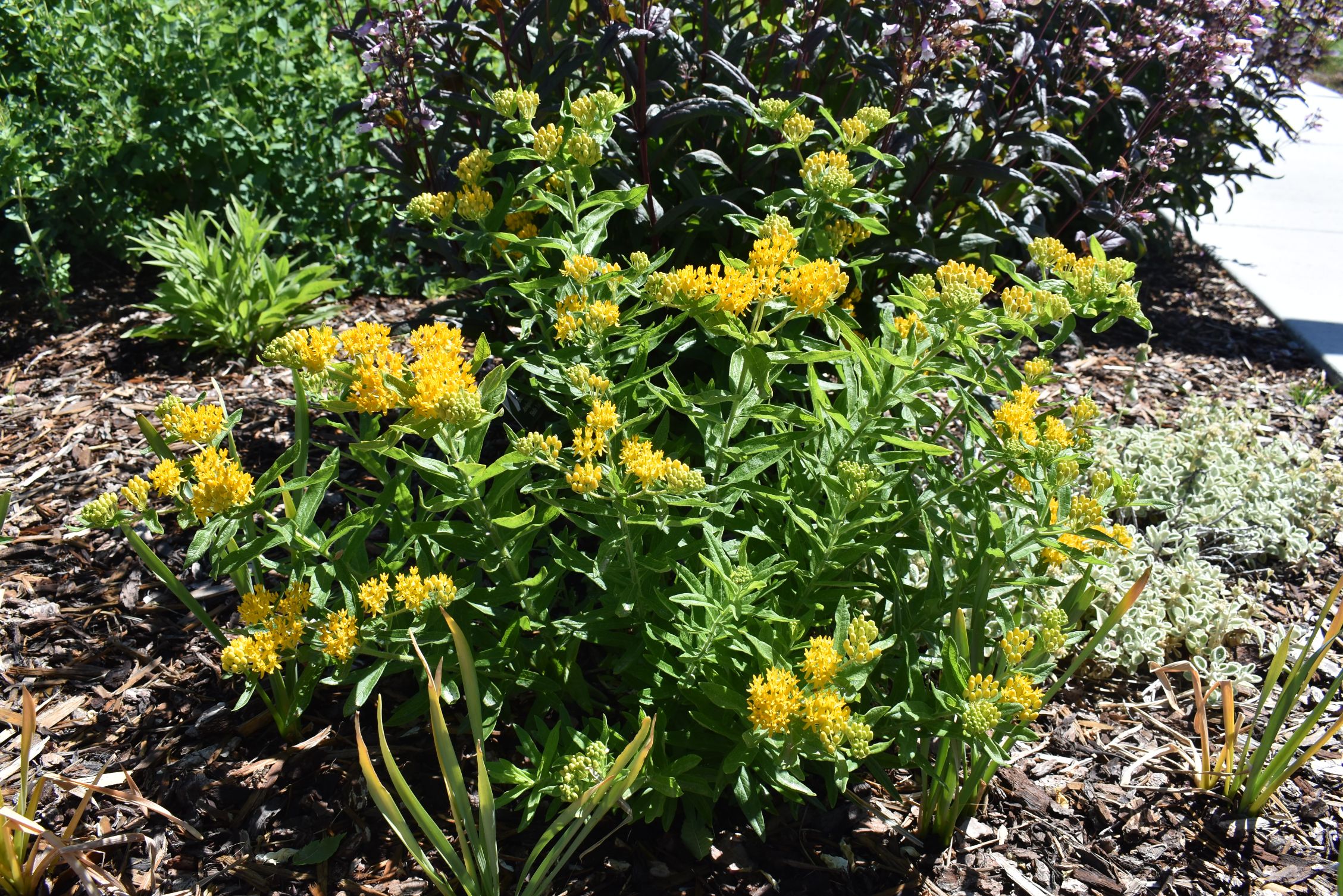
Hello Yellow Butterflyweed Asclepias tuberosa 'Hello Yellow'
This cultivar of butterflyweed, a native relative of milkweed, has attractive flat-topped clusters of bright golden yellow blossoms last throughout the summer. The blooms sit on clumps of upright stems that are covered in narrow tipped leaves. After the blooming period, spindle-shaped seed pods emerge. Butterfly weed is a prominent source of nectar for butterflies, and the foliage is a food source for the larvae of monarch butterflies.
-
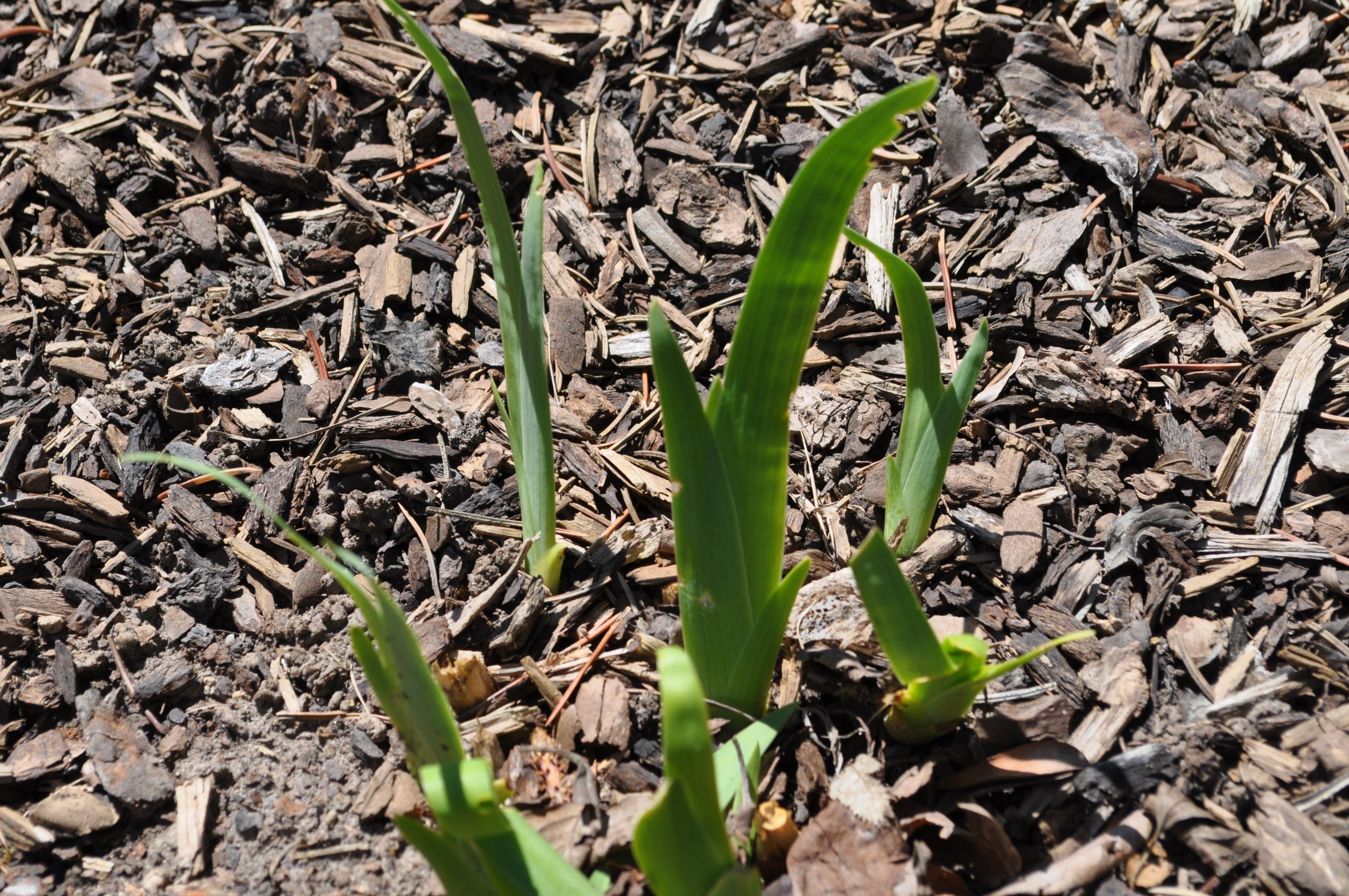
Hello Yellow Leopard Lily Iris domestica 'Hello Yellow'
Sword-shaped leaves grow in clumps up to 10 inches tall. Yellow lily flowers bloom on stalks above the foliage in mid-summer. Flowers turn to seed pods that open when dried revealing clusters of black seeds that resemble blackberries. The plant is sometimes known as blackberry lily.
-
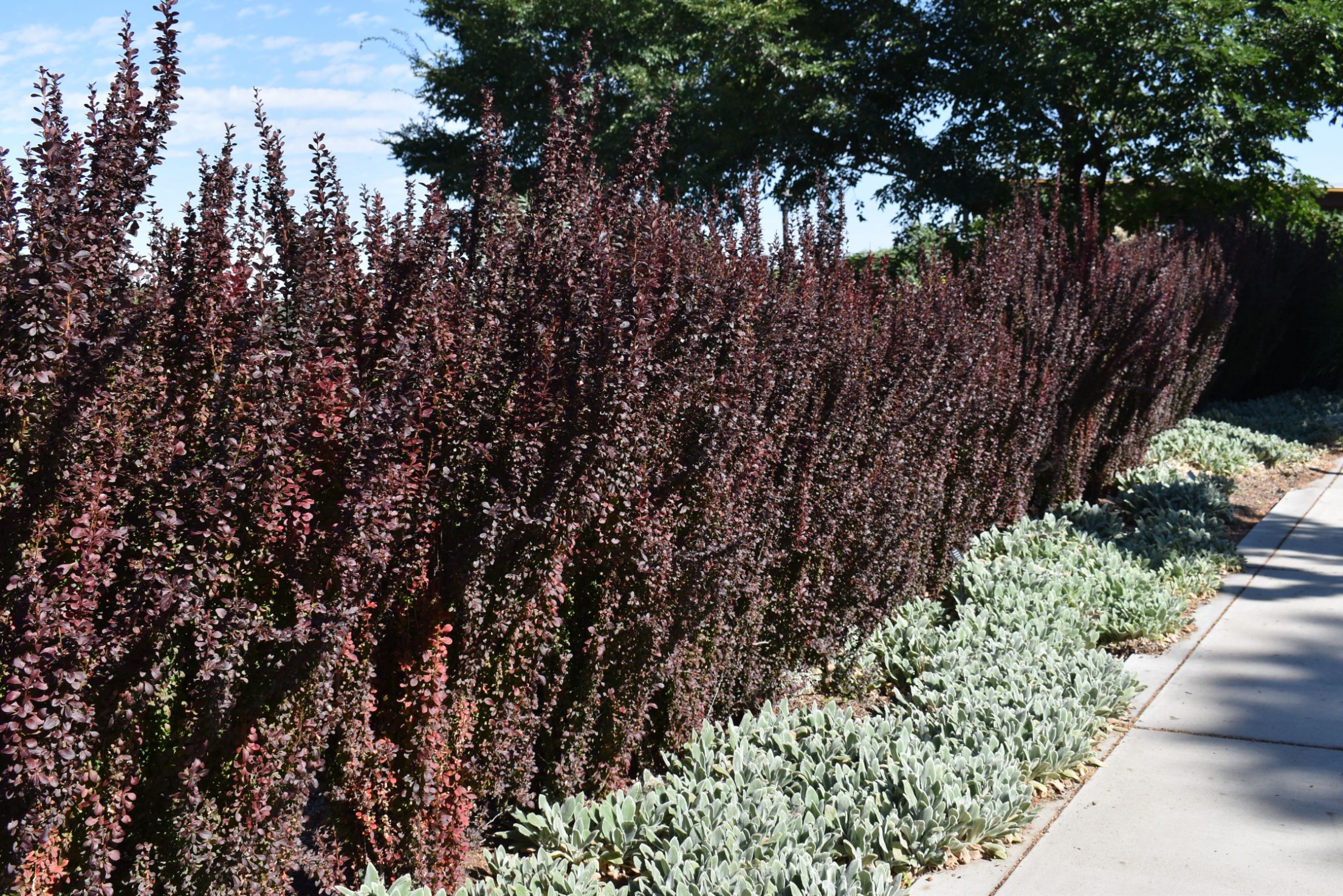
Helmond Pillar Japanese Barberry Berberis thunbergii f. atropurpurea 'Helmond Pillar'
A distinguished shrub with multiple stems that form narrow columns of reddish-purple deciduous foliage. A great choice for screening, small spaces, and anywhere you want a formal-looking natural fence without the pruning required by hedges. Inconspicuous yellow flowers appear in spring, turning to bright red berries that stay on the shrub into winter. Stems have very sharp thorns. Tolerant of many soils and conditions.
-

Henfield Brilliant Sun Rose Helianthemum 'Henfield Brilliant'
Low-growing, shrubby evergreen perennial. Small, silvery green, lance-shaped leaves are downy. Bears profuse red-orange rose-shaped flowers in late-spring to early-summer. Grows well as a groundcover or in rock gardens. Presents a very stunning show when covered with flowers.
-
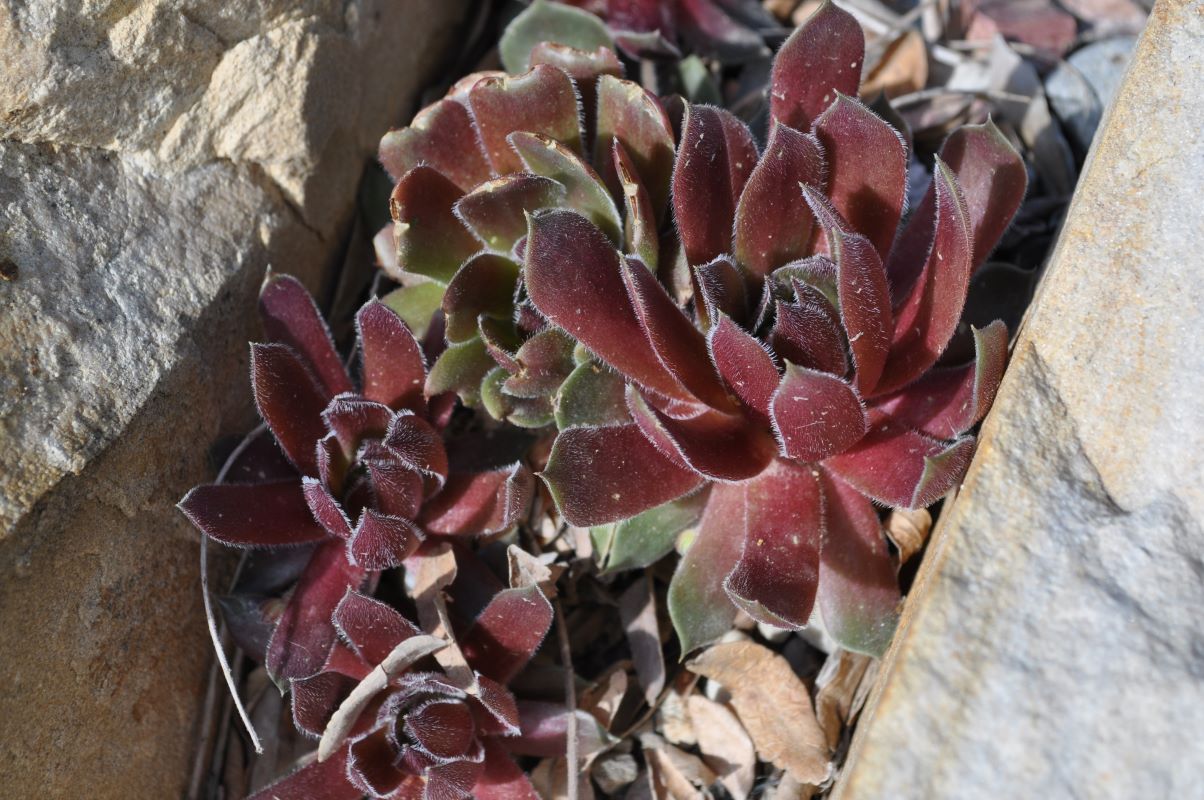
Hens and Chicks Sempervivum tectorum
Low-growing, mat-forming perennial succulent. Rosettes of thick pointed leaves with bristly margins vary in their coloring intensity of light-green bases and red tips. In winter the leaves develop larger red areas. After flowering, the rosettes will die but are replaced by new offset rosettes. Flowers vary from light pink to red. Plants require excellent drainage and little water. Avoid excessively wet winter soil. Great choice for rock gardens, crevices or well-drained pots.
-
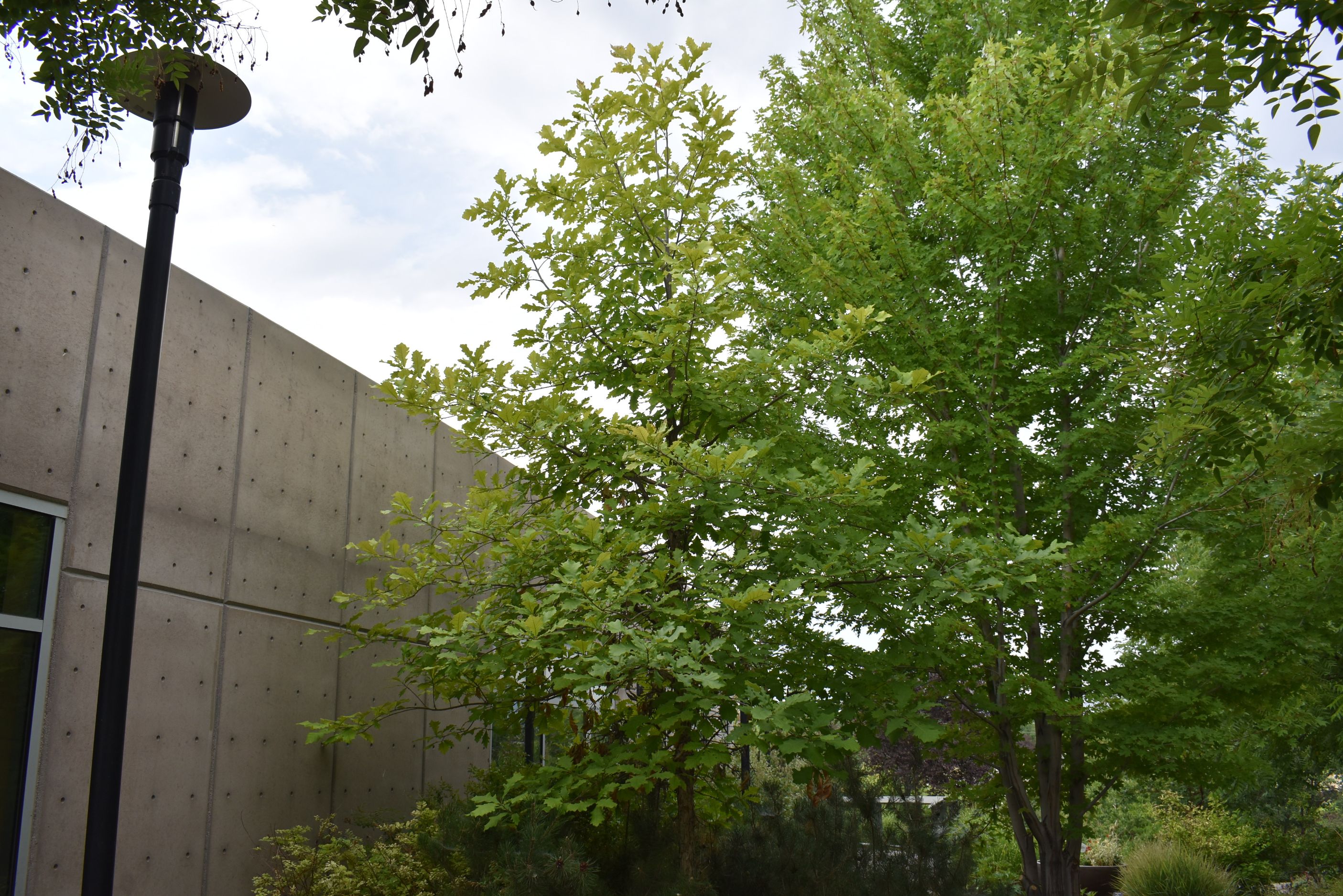
Heritage Oak Quercus x macdanielii 'Clemson'
This hybrid of Bur Oak and English Oak brings together the best of both species with exceptional vigor. It will grow into a large specimen shade tree with a broad pyramid shape, so make sure to give it plenty of space. The shiny, lobed, dark green leaves are silver underneath and turn golden in the fall. Resistant to mildew and very cold tolerant.
-
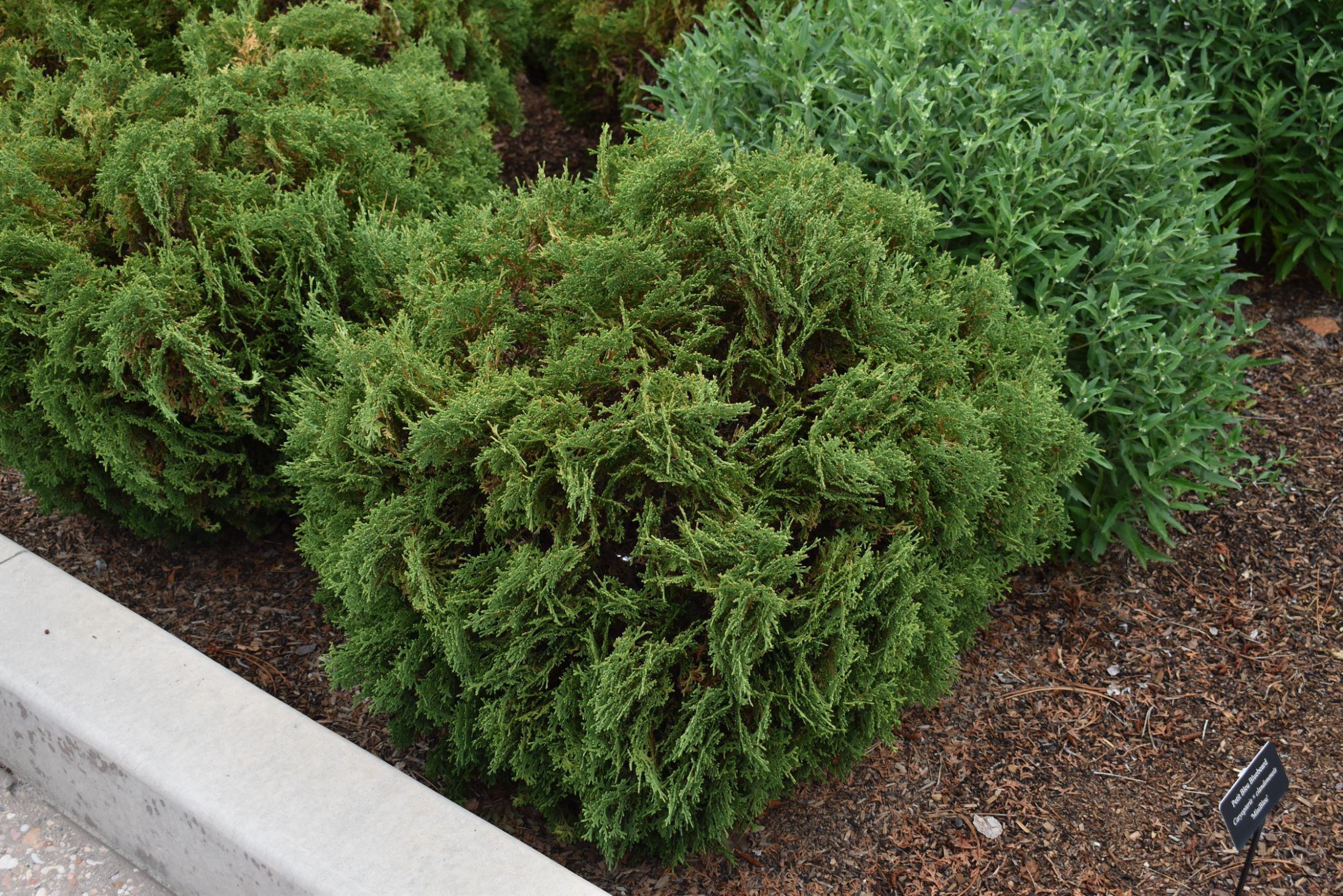
Hetz Midget Arborvitae Thuja occidentalis 'Hetz Midget'
A small evergreen shrub with a dense globe shape that requires no hedging. Very tough, adaptable and durable. Perfect for borders, containers, and formal gardens. Somewhat wide range of soil tolerance, but prefers moist, neutral to alkaline, well-drained loams.
-
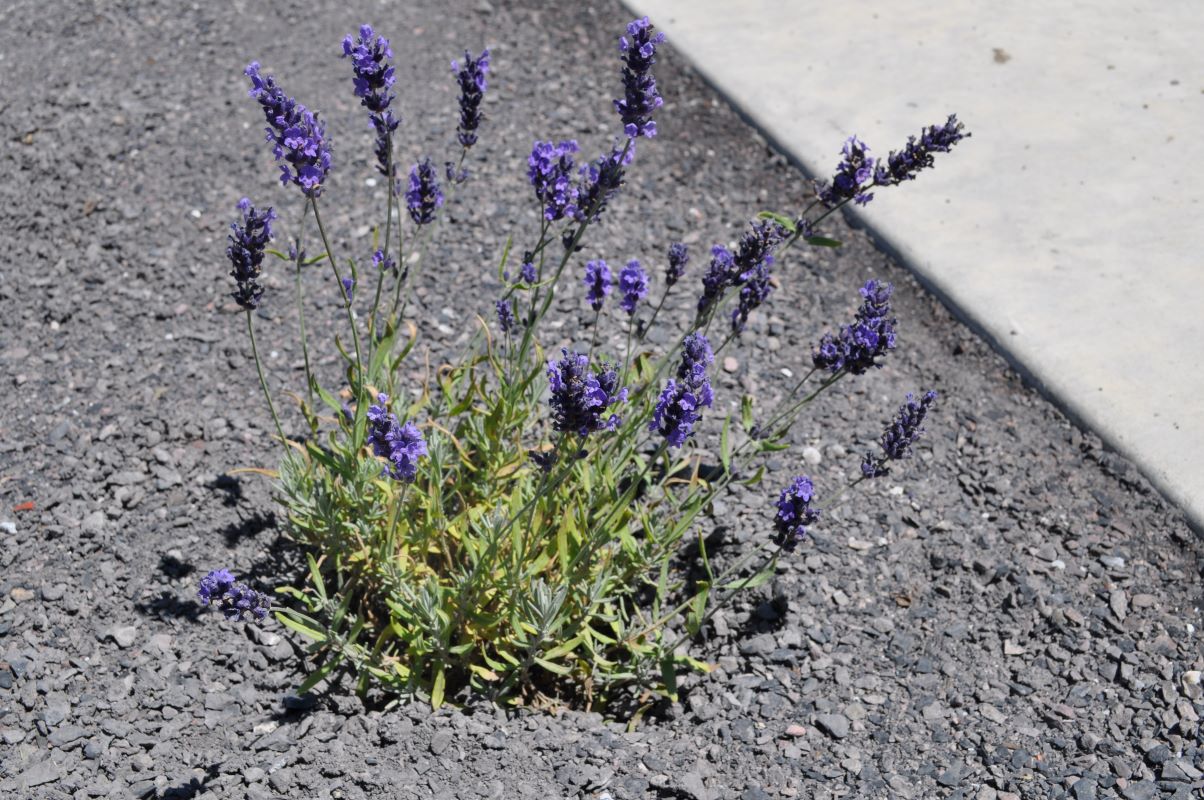
Hidcote Blue Lavender Lavandula angustifolia 'Hidcote Blue'
A cold-hardy, compact evergreen shrub with value both as an herb for its soothing fragrance and as a beautiful water-wise landscape plant. Fragrant, purple-blue blossoms cover tall, slender stems, giving a colorful effect when planted en masse. These can be harvested in their bud stage and dried for indoor use. The flower spikes sit above compact mounds of attractive gray-green foliage. Perfect for edging paths or tucking into rock gardens. Prefers well-drained soil and full sun but can handle some shade.
-
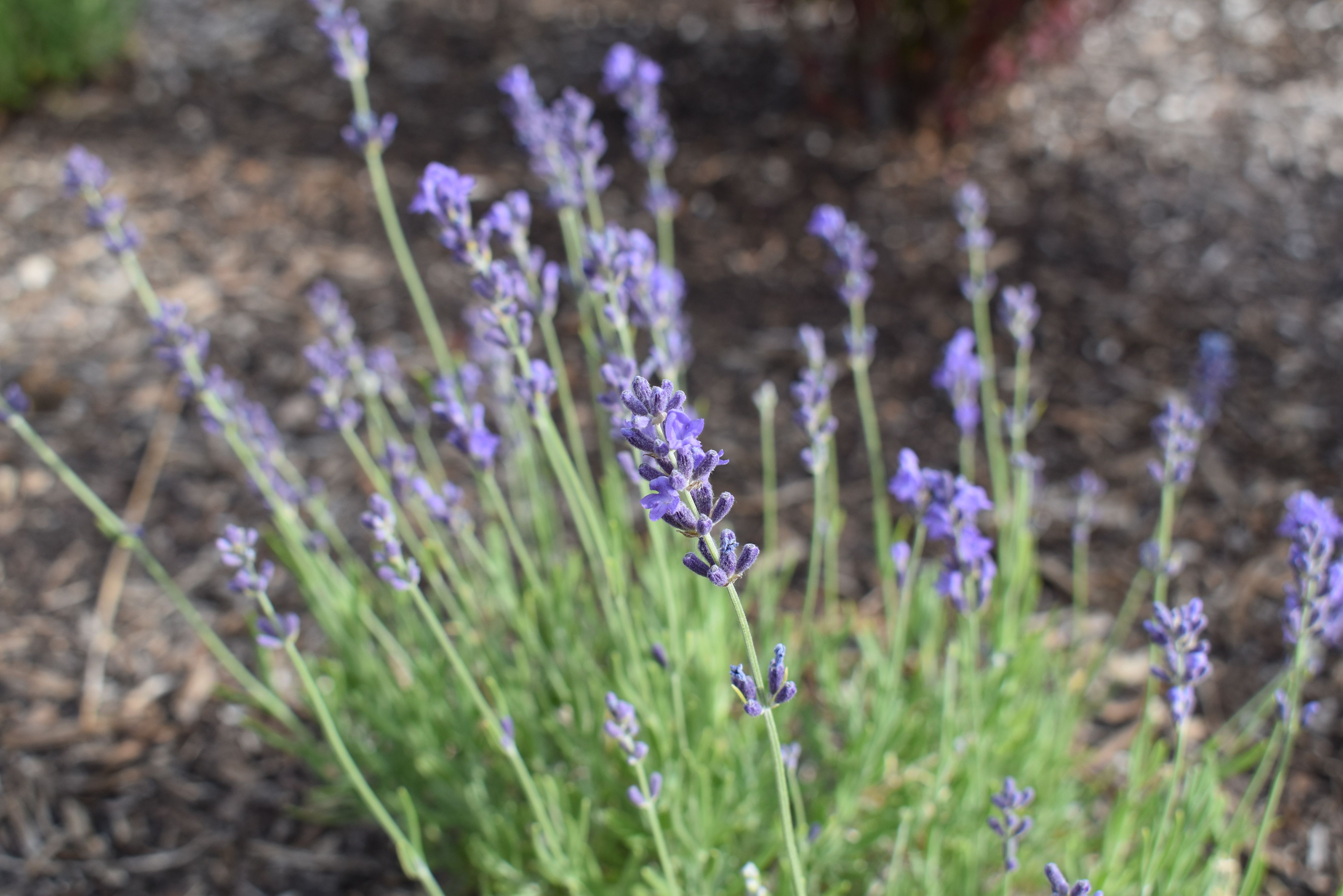
Hidcote Lavender Lavandula angustifolia 'Hidcote'
Great multi-use plant used as an herb for its soothing fragrance and as a water-wise landscape plant. A compact, bushy shrub with gray-green leaves and a pretty Mediterranean look. The fragrant, bluish purple to blue blossoms form on long stalks in late spring to early summer. These can be harvested in their bud stage and dried for indoor use. Cold-hardy, drought tolerant, and prefers well-drained soil.
-
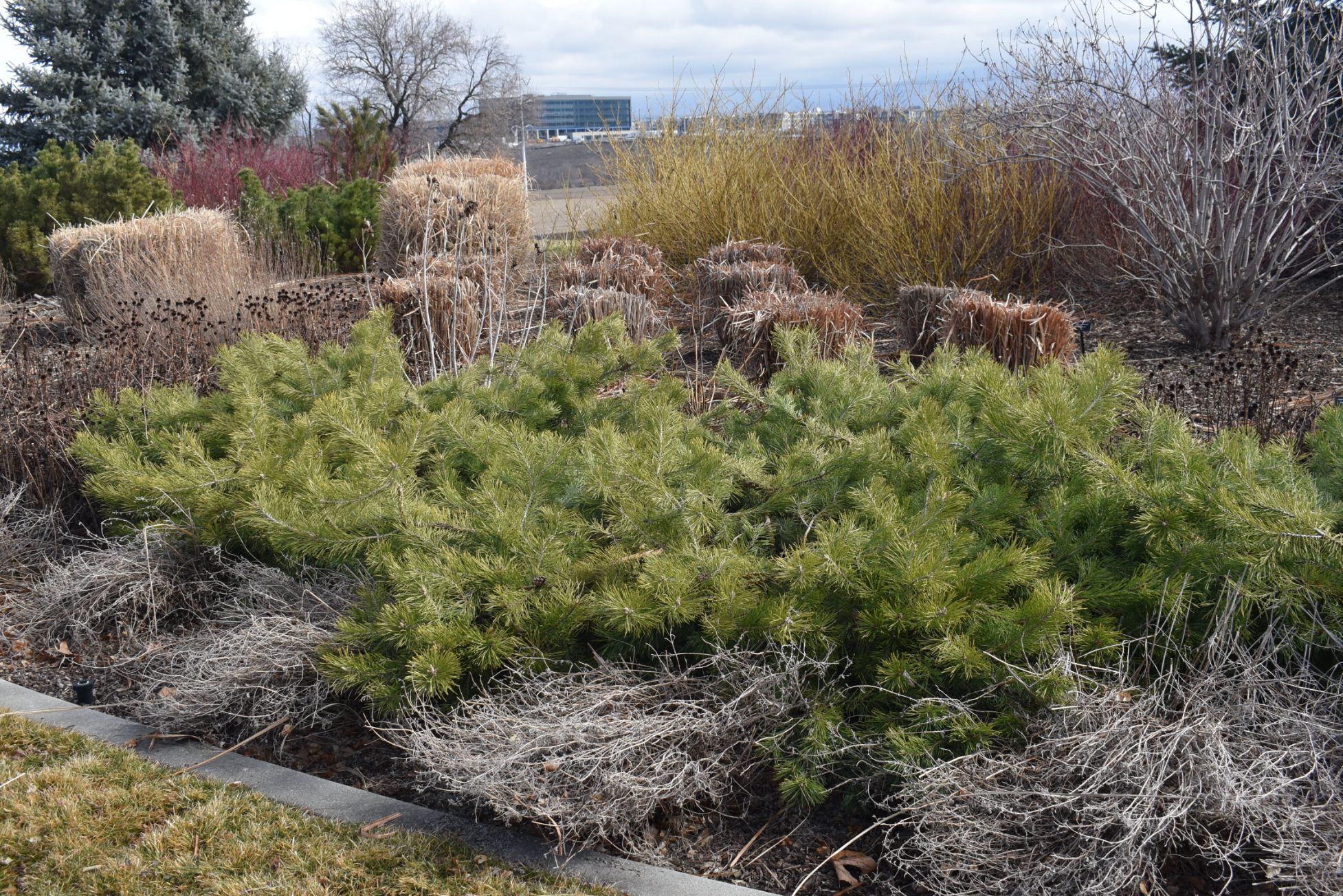
Hillside Creeper Scots Pine Pinus sylvestris 'Hillside Creeper'
A unique low-growing cultivar of Scotch Pine with spreading branches that hug the ground. Flaky red-brown to orange bark is very attractive. Clusters of twisted evergreen needles may turn a lighter shade of green in the winter months. An effective statement shrub for hillsides and rock gardens. Grows vigorously and slows with age. Plant in full sun in well-drained soil.
-
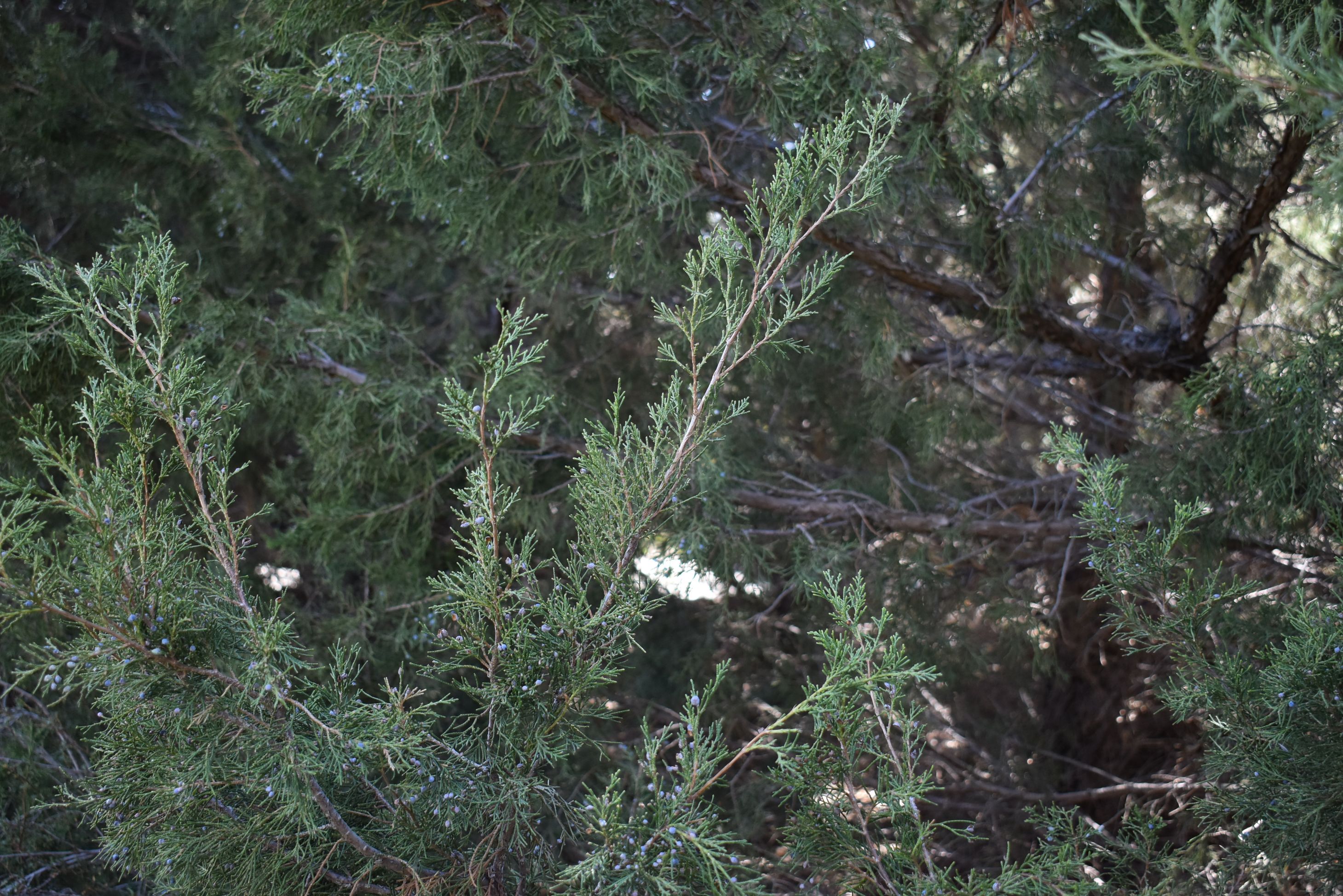
Hillspire Eastern Red Cedar Juniperus virginiana 'Hillspire'
A narrow cone-shaped cultivar of the much larger Eastern Red Cedar. Densely growing, bright-green foliage is the most noteworthy characteristic. Bright blue berries stand out against the foliage in late-summer to fall. Tolerant of a wide range of conditions and soil types.
-
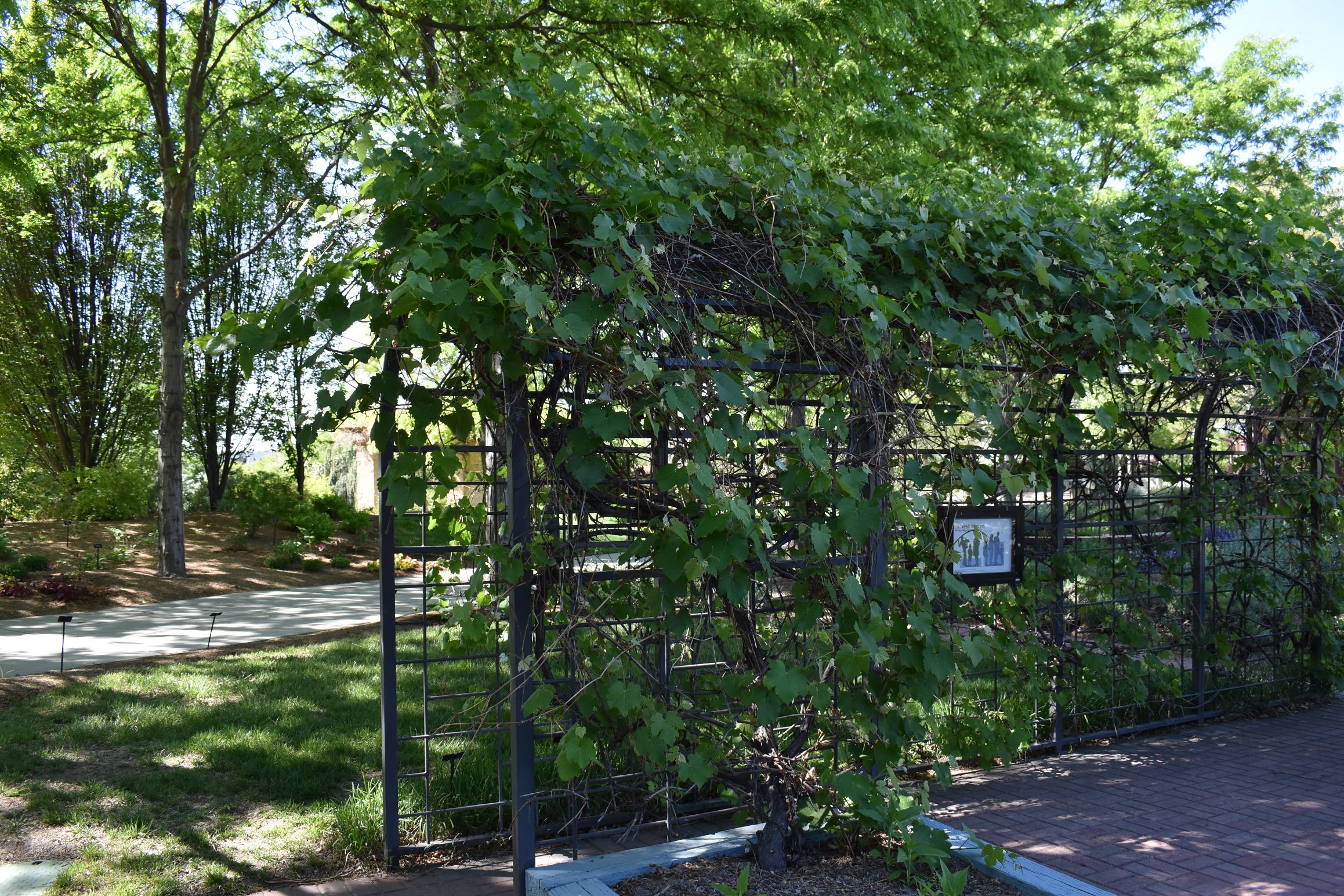
Himrod Grape Vitis 'Himrod'
American early ripening grape variety. Inconspicuous fragrant green flowers appear in spring and lead to bunches of white seedless grapes maturing to yellow. To maximize fruit production training, pruning, and regular spraying are required. Consult your local extension agency for specific instructions. Fruit is great for eating and making raisins. Vines do have ornamental value as well. Grow in sheltered area with well drained soils and moderate watering.
-
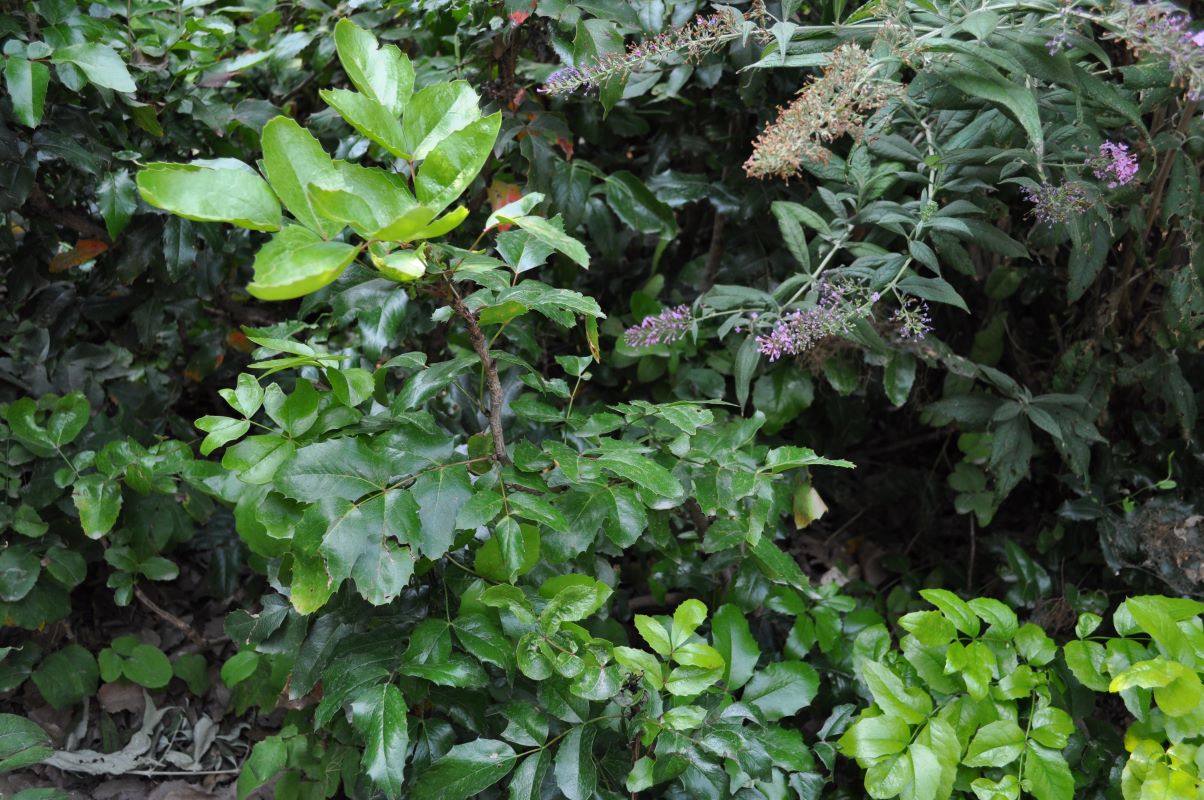
Holly-Leaf Oregon Grape Mahonia aquifolium
A broadleaf evergreen shrub native to the pacific Northwest that looks great in every season. Leaves are spiny and turn a purple-red color in the winter. Vibrant yellow flowers in spring are followed by blue berry clusters. Great for mass planting in problematic dry shade sites.
-
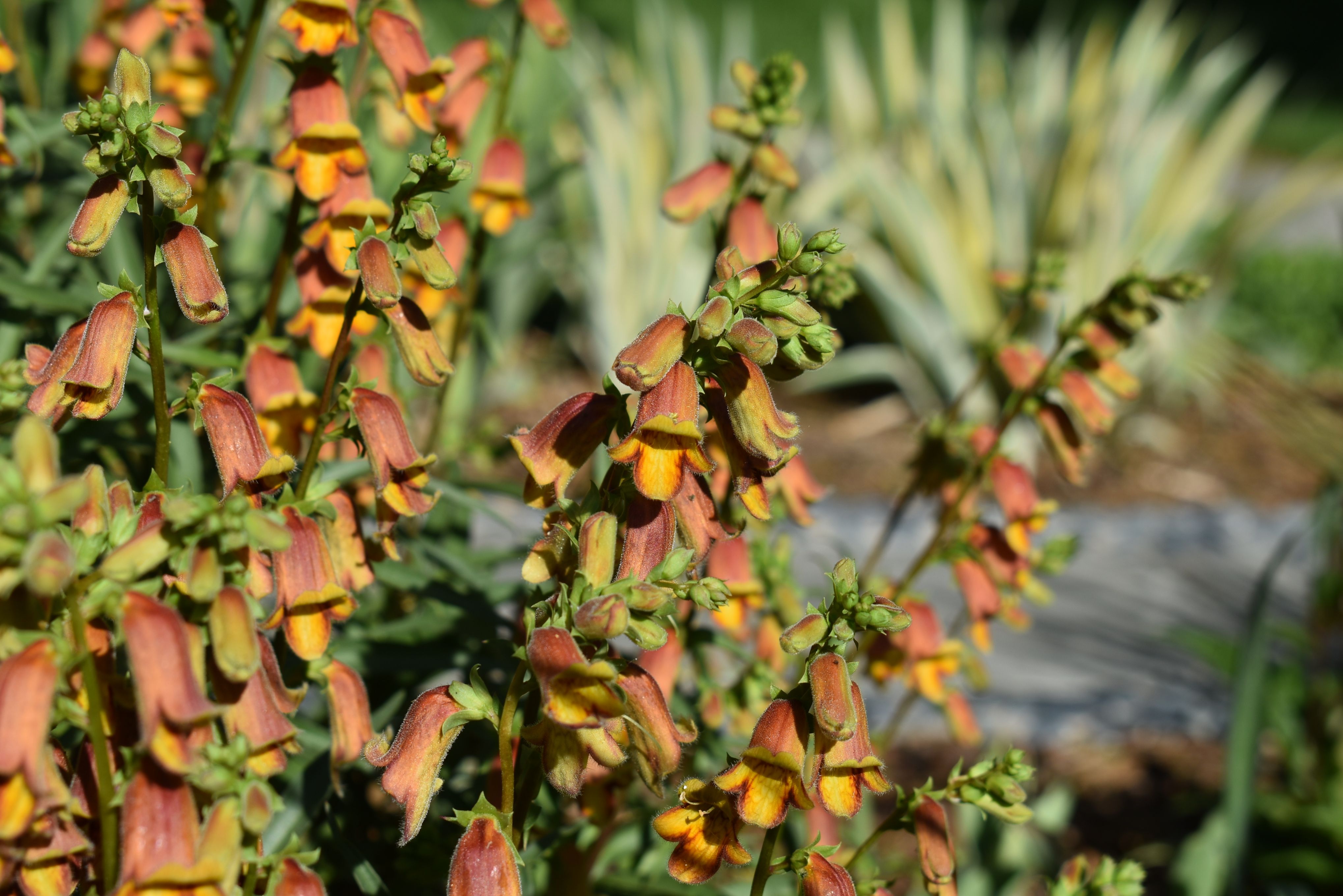
Honey Trumpet Foxglove Digitalis 'Honey Trumpet'
A semi-evergreen perennial with bell-shaped amber and honey colored flowers. The flowers bloom on 2-foot-tall spikes and can last for several weeks. It forms a dark green glossy rosette of leaves at the base. Prefers average conditions including regular deep watering. All foxglove leaves are poisonous to pets and humans.
-
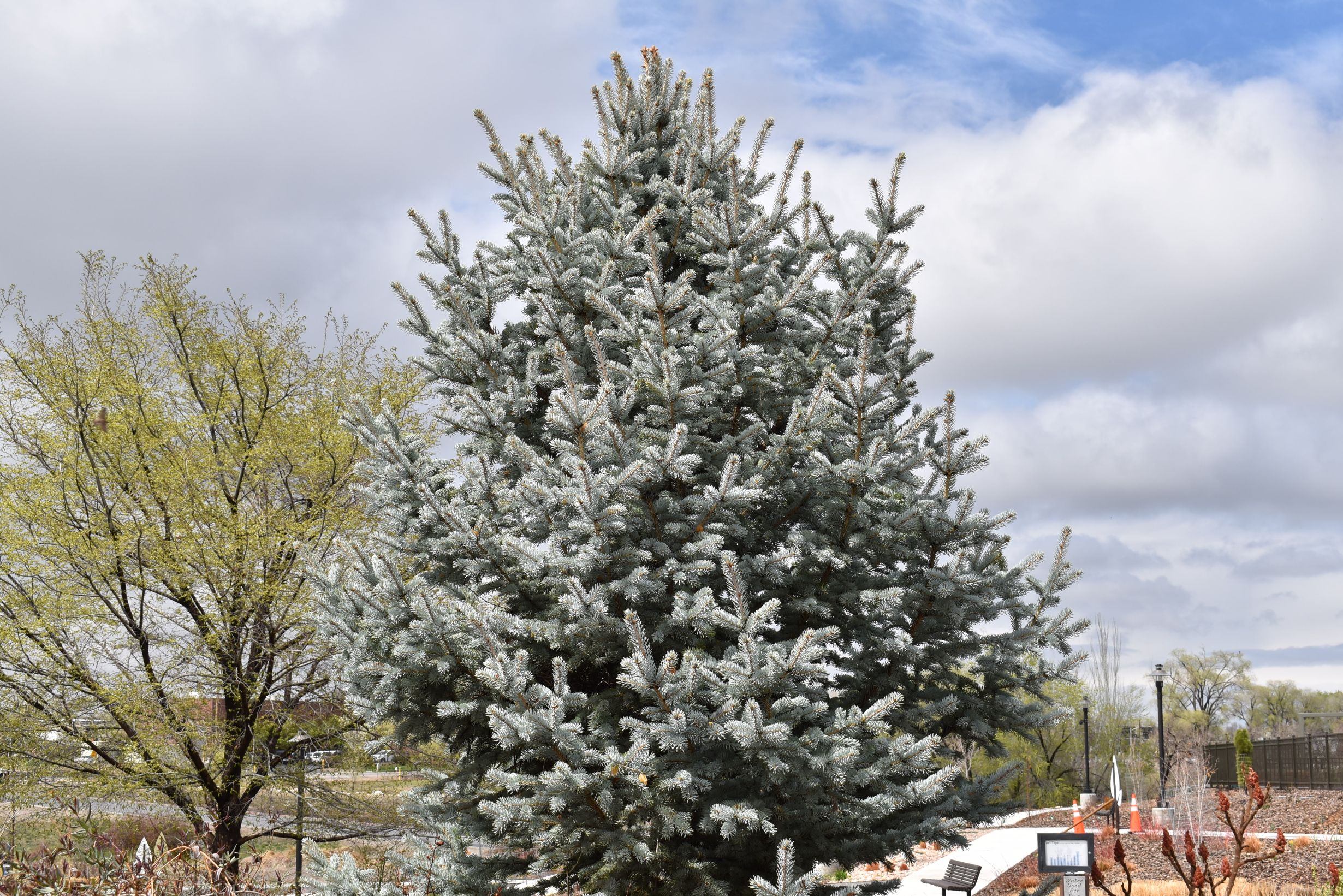
Hoop's Blue Spruce Picea pungens 'Hoopsii'
A dense, pyramid-shaped cultivar of Colorado spruce that retains the blue coloring and stiff needles of the species. Though smaller than the species, this variety can still get big, so give it plenty of room. A reliable, drought-tolerant tree to use as a focal point in the perimeter of the landscape.
-
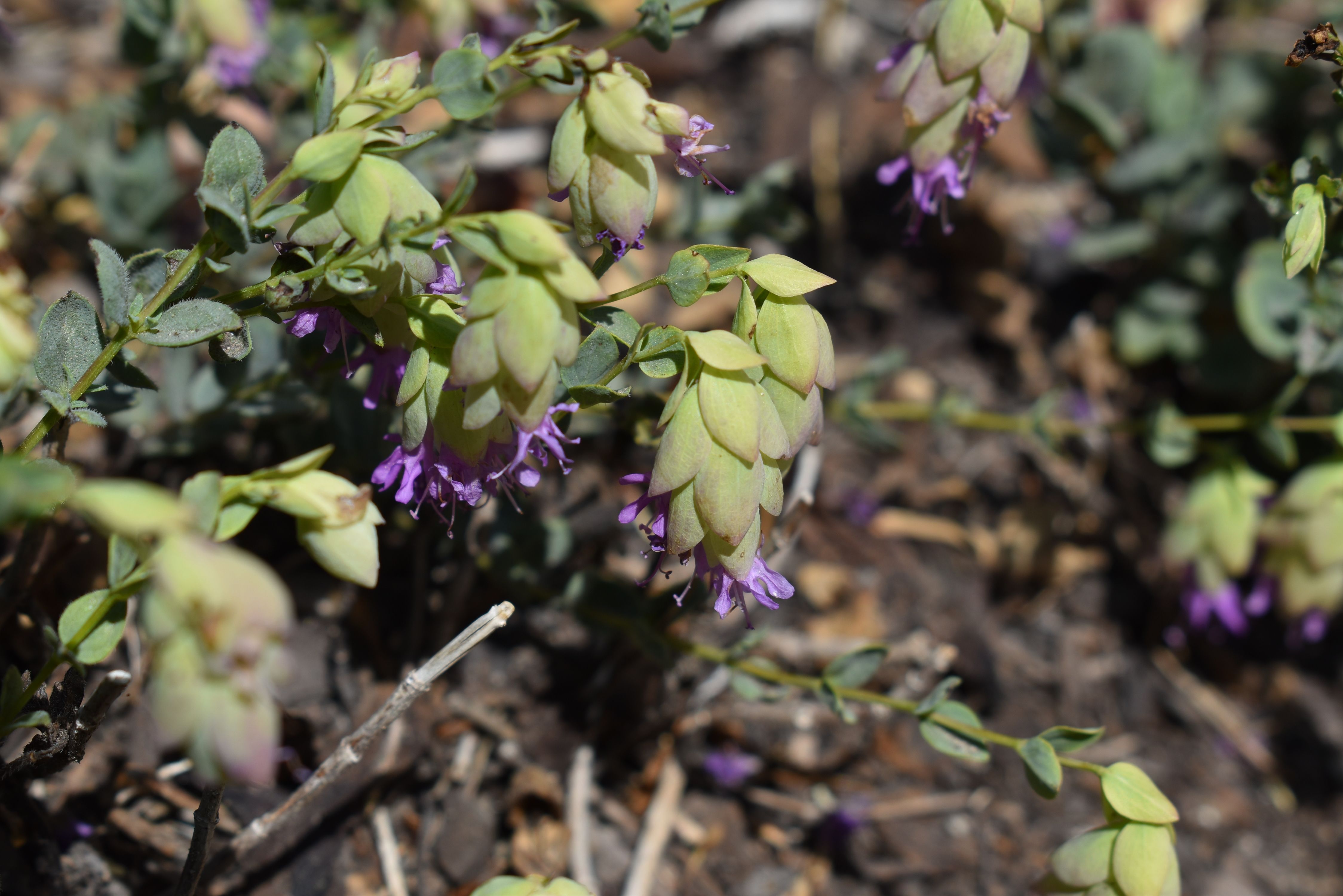
Hopflower Oregano Origanum libanoticum
A vigorous trailing herb with cascades of blushing lavender and chartreuse hop-like bracts in late summer. Show off the pendulous blooms by planting it at the edge of a raised bed or rock wall.
-
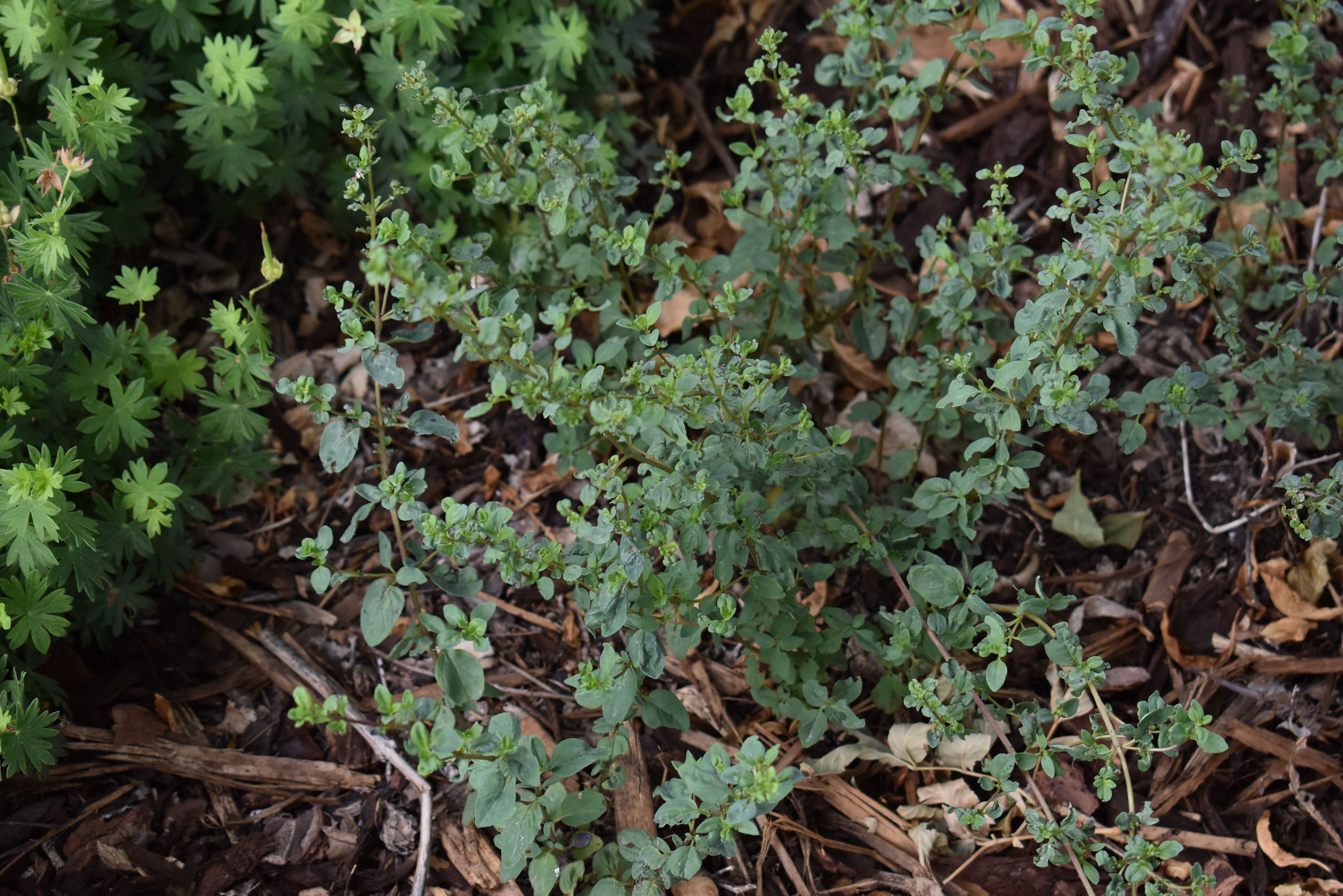
Hopley's Oregano Origanum laevigatum 'Hopleys'
Erect herbaceous perennial with woody base grown primarily for its ornamental value. Dark green leaves are borne on purple-red stems and though aromatic are not as useful for culinary purposes as O. vulgare. Clusters of pink flowers with dark purple bracts are grown in mid to late-summer and into fall. Grow in well-drained soils. Tolerates heat and drought.
-
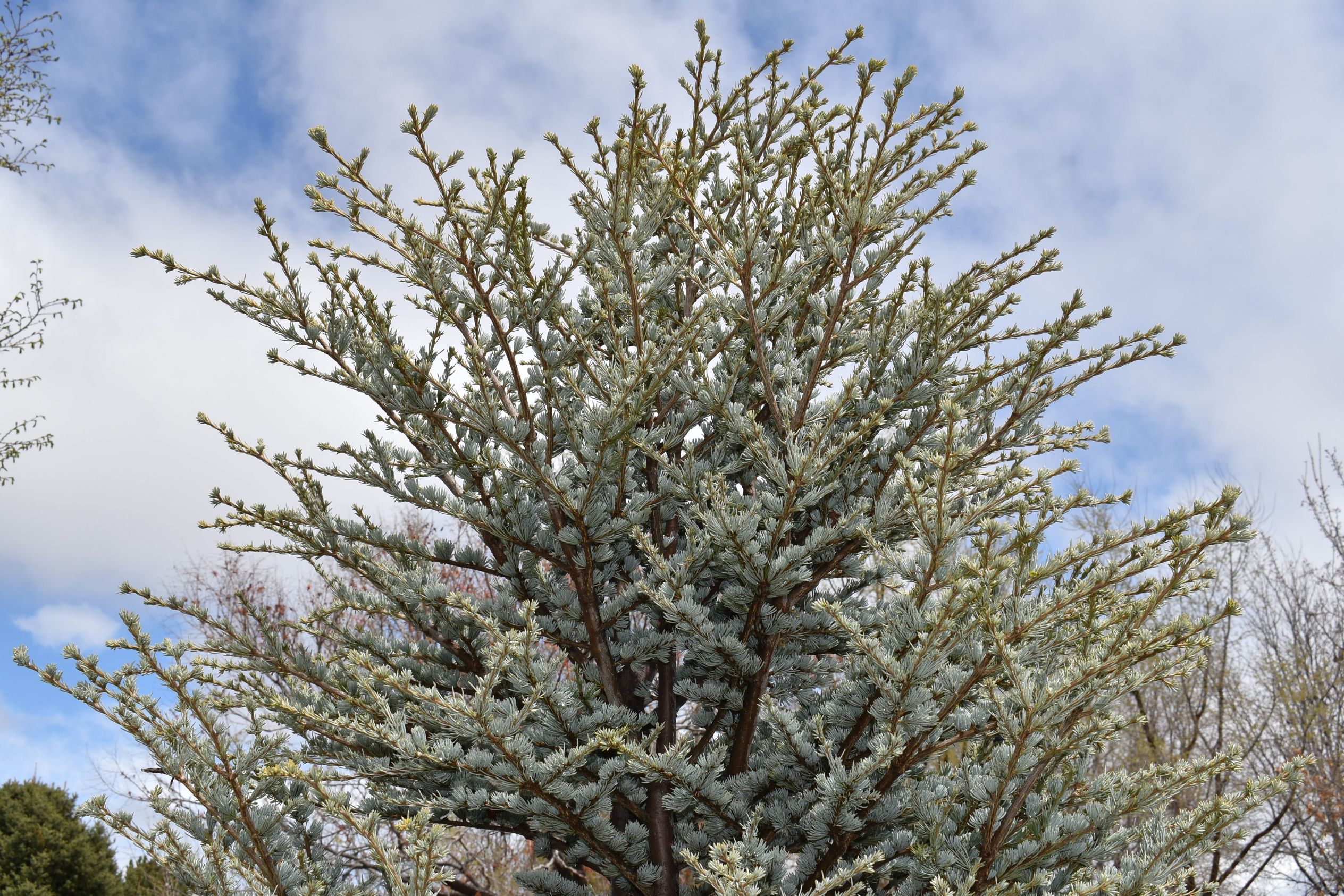
Horstmann Blue Atlas Cedar Cedrus atlantica 'Horstmann'
Semi-dwarf evergreen tree with short bluish green needles. Has an irregular, open pyramidal form and is best used as a specimen tree. Trunk stays fairly straight and looks best when branches are left on to the ground. A beautiful evergreen for small spaces.
-
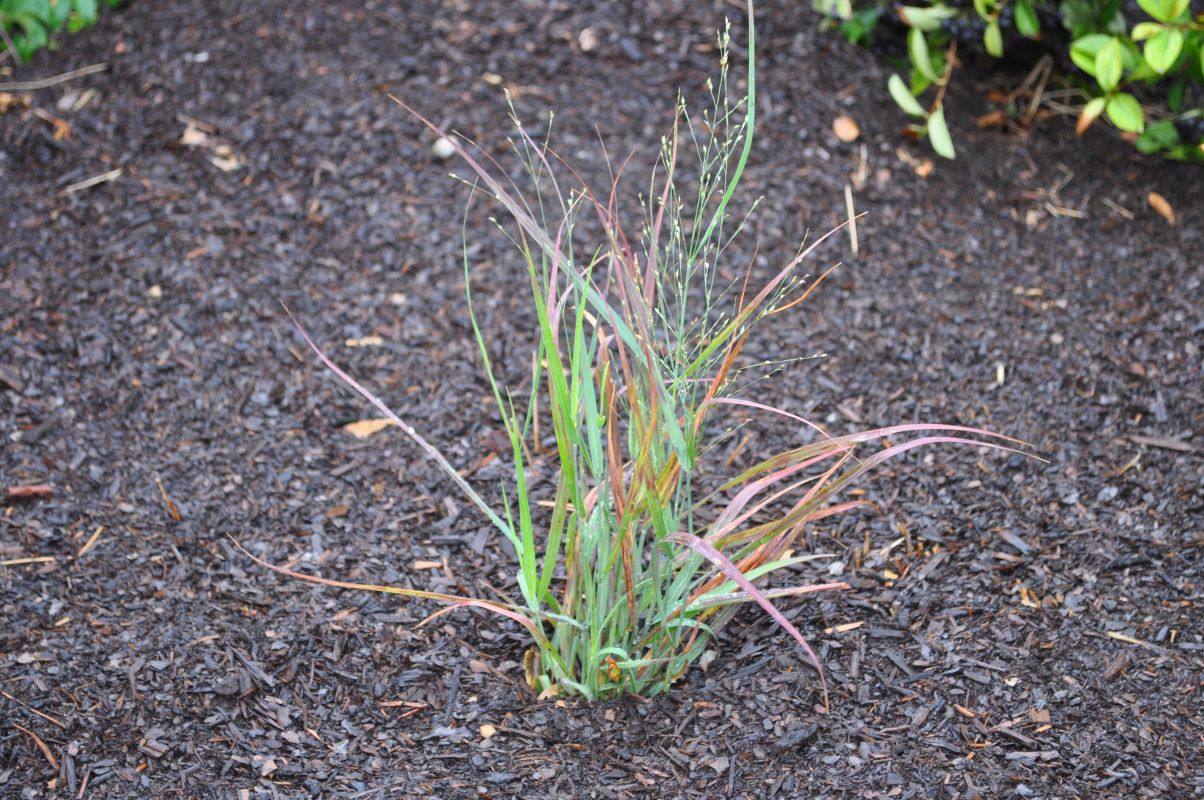
Hot Rod Switch Grass Panicum virgatum 'Hot Rod'
This compact, clumping ornamental grass has a beautiful upright form. The foliage starts off blue-green and turns a deep burgundy in the summer. Light, feathery, purple seed heads offer winter interest. The species is native from Utah to the east coast.
-
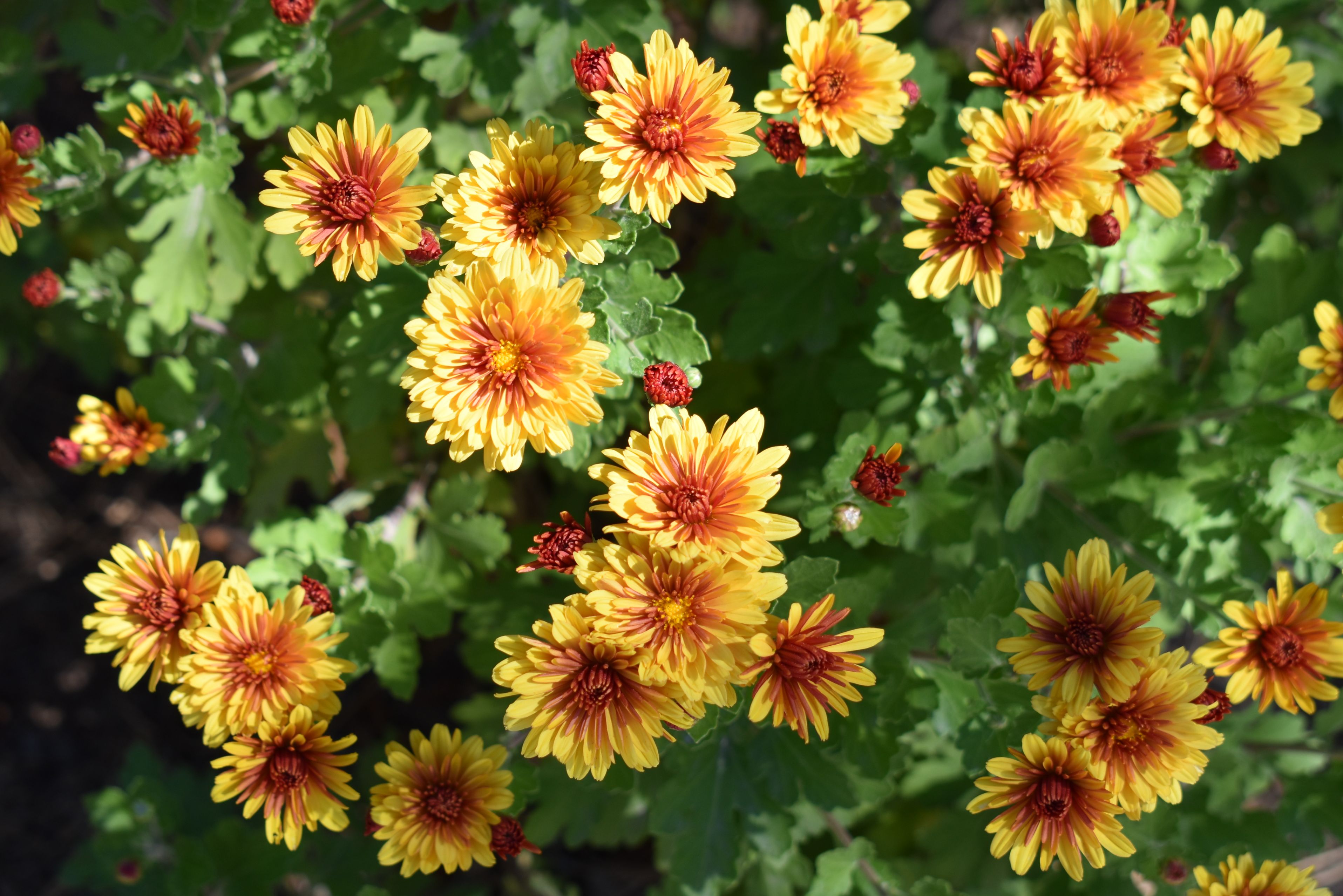
Hot Spot Bronze Garden Mum Chrysanthemum x morifolium 'Hot Spot Bronze'
A densely mounding perennial Mum that is covered with large flowers in fall. The flowers have orange-red centers and golden outer petals. Brings a colorful, festive atmosphere to the autumn landscape.
-
Hot Summer Coneflower Echinacea 'Hot Summer'
An upright coneflower with petals that change color as they mature. The flowers emerge as a yellow-orange eventually changing to straight orange and finally red as it matures. The leaves are green and ovate with distinct veins. The flowers are long-lasting and work well as cut flowers.
-
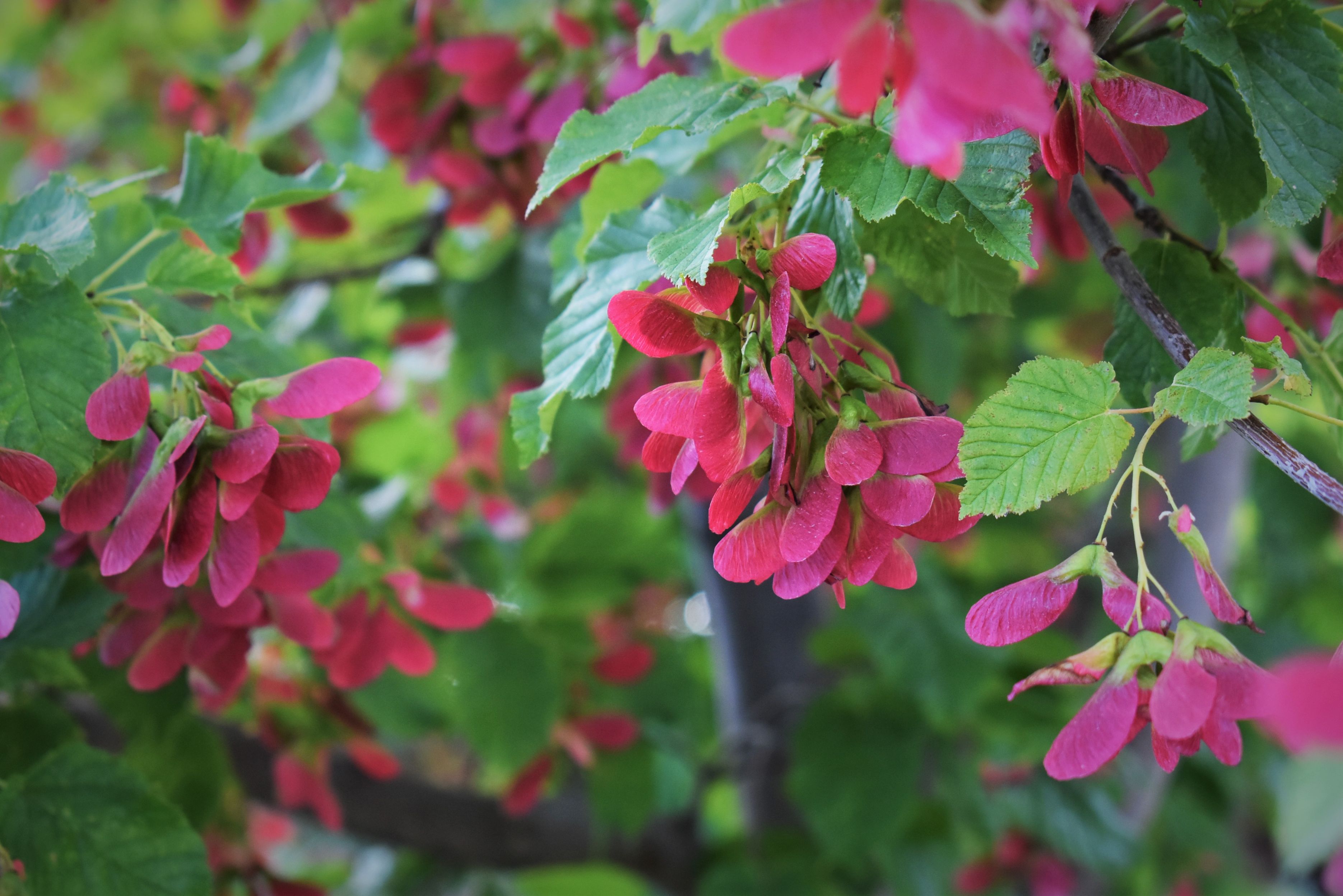
Hot Wings Tatarian Maple Acer tataricum 'GarAnn'
A smaller selection of the tatarian maple, this spectacular variety sports bright red samaras (the helicopter seeds common to all maples) that brighten the tree all summer long. With its vivid fall color and tolerance of alkaline soils, this is a must-have small tree for Utah landscapes.
-
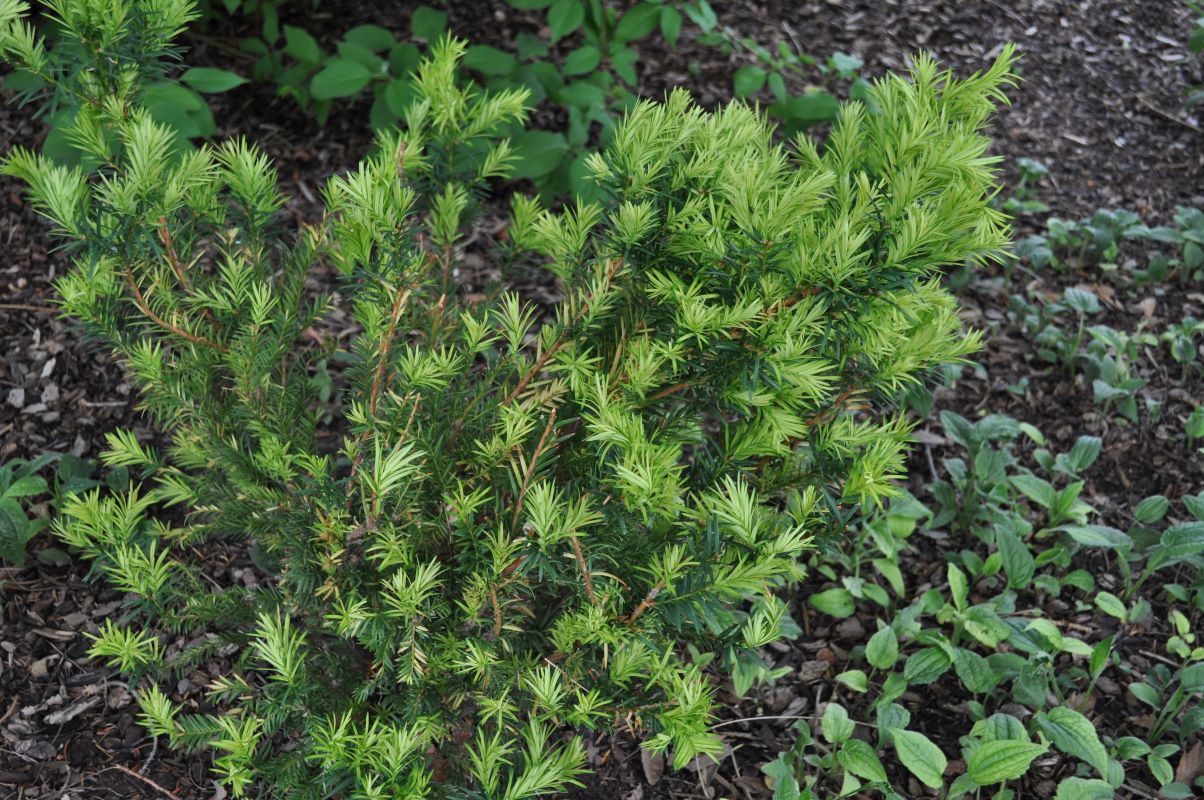
Huber's Tawny Gold Spreading Yew Taxus x media 'Huber's Tawny Gold'
Dense, spreading evergreen shrub. This shrub can be used for a hedge, border, or screen. Green needle-like foliage reaches out from the plant as it turns to a golden yellow color. Scarlet ornamental berries pop out from the branches. Great for shady places like underneath tree canopies.
-
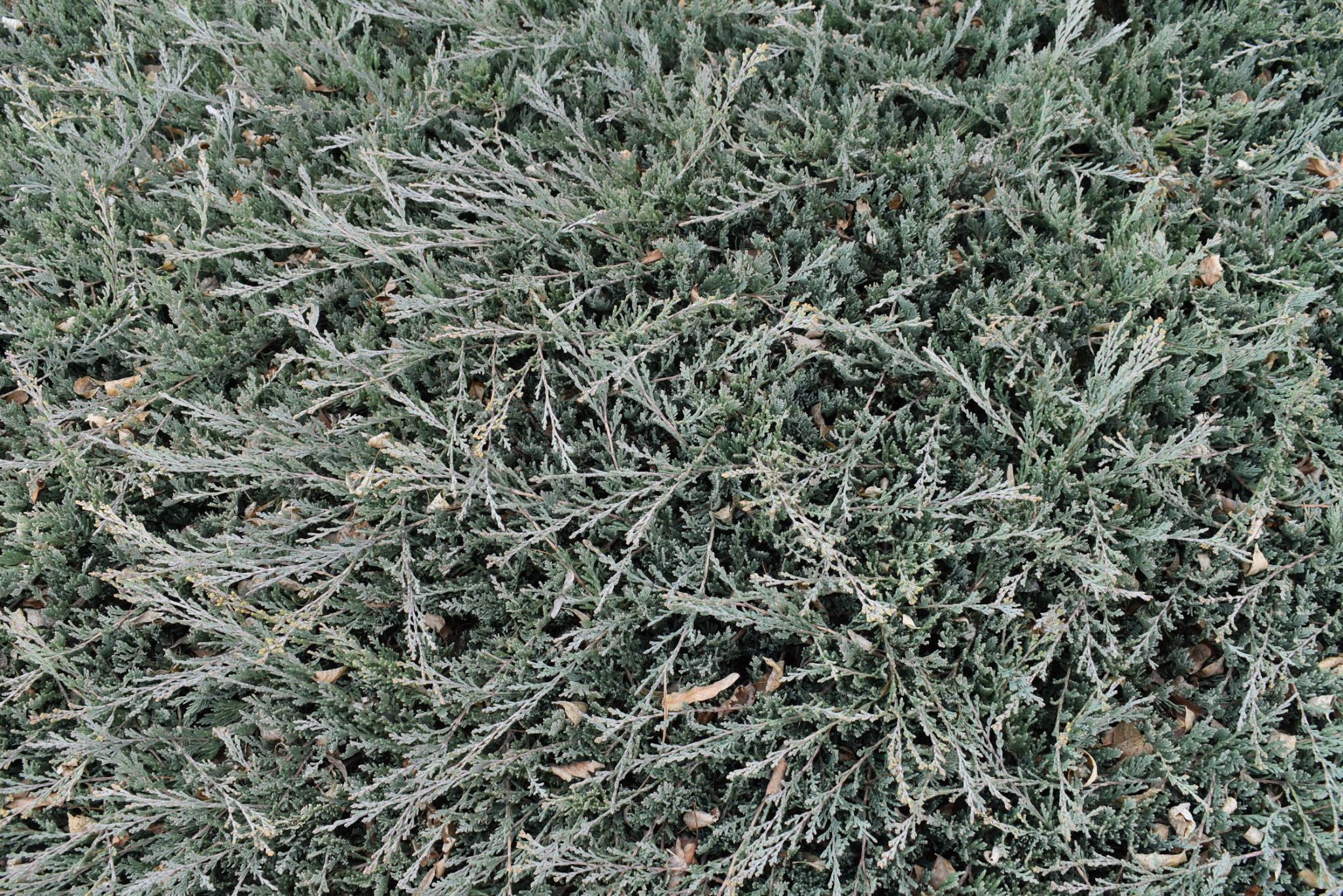
Hughes Juniper Juniperus horizontalis 'Hughes'
A very low-growing, spreading evergreen shrub, this juniper has silvery blue leaves that are purple-tinged in the winter and more green in the summer. It is useful as a groundcover or mixed with other low-growing shrubs. Once established, it requires very little water to thrive.
-
Hummelo Betony Stachys officinalis 'Hummelo'
Cultivar of wood betony with large, green, crinkled leaves with prominent veins and serrated edges. The flowers of this cultivar are small, rosy, two-lipped blooms that are grouped in spiked clusters. Drought tolerant once established.
-
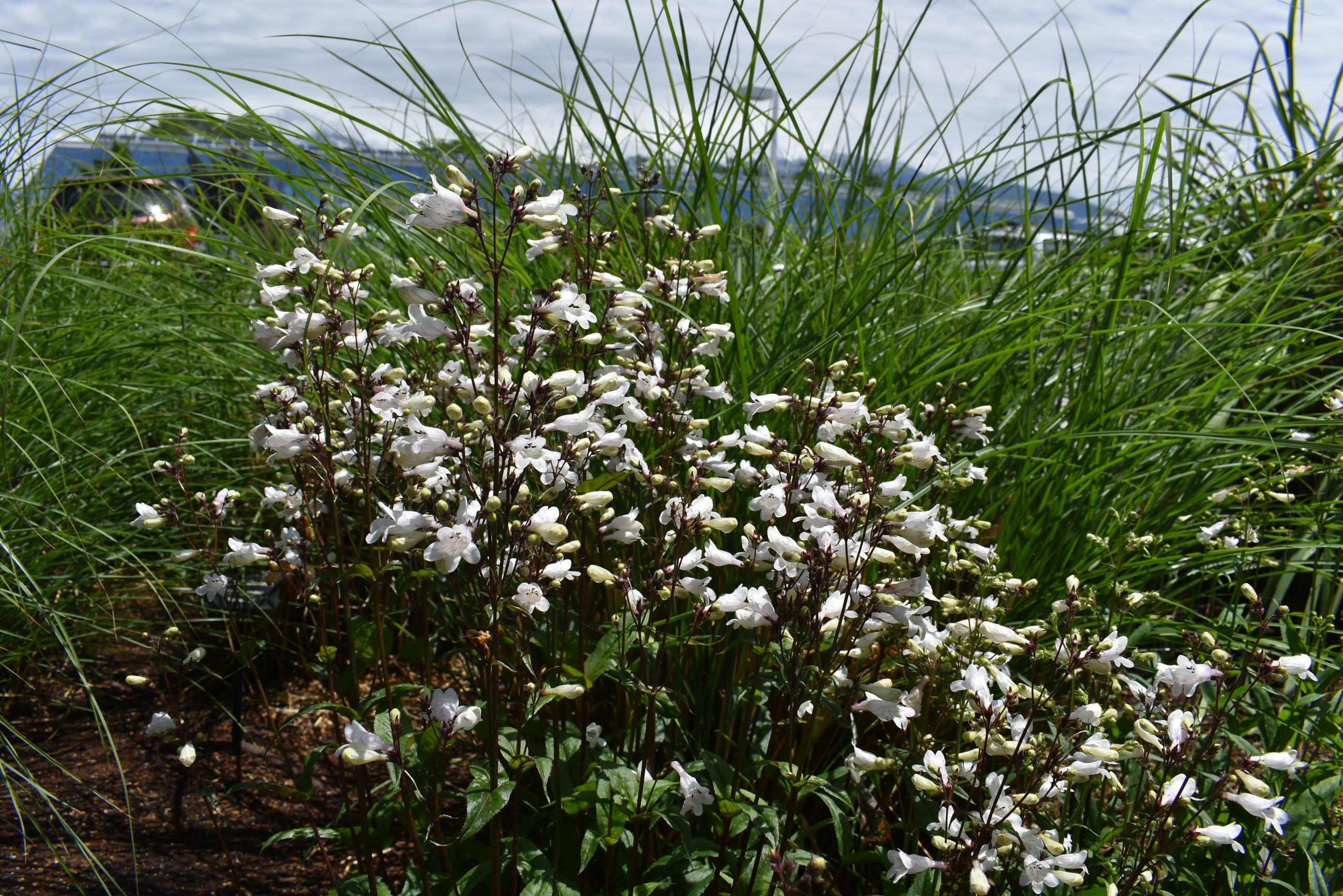
Husker Red Penstemon Penstemon digitalis 'Husker Red'
The tall, upright stems of this semi-evergreen perennial show off beautiful maroon-red new foliage that turns dark green tinted with red with age. White pink-tinted flowers turn to a deep purple seed head, which can be left or dead headed. Blooms early to mid summer. Fall turns the leaves into a gradient of apricot and burgundy. Native to the eastern US and requires more water than most other penstemons.
-
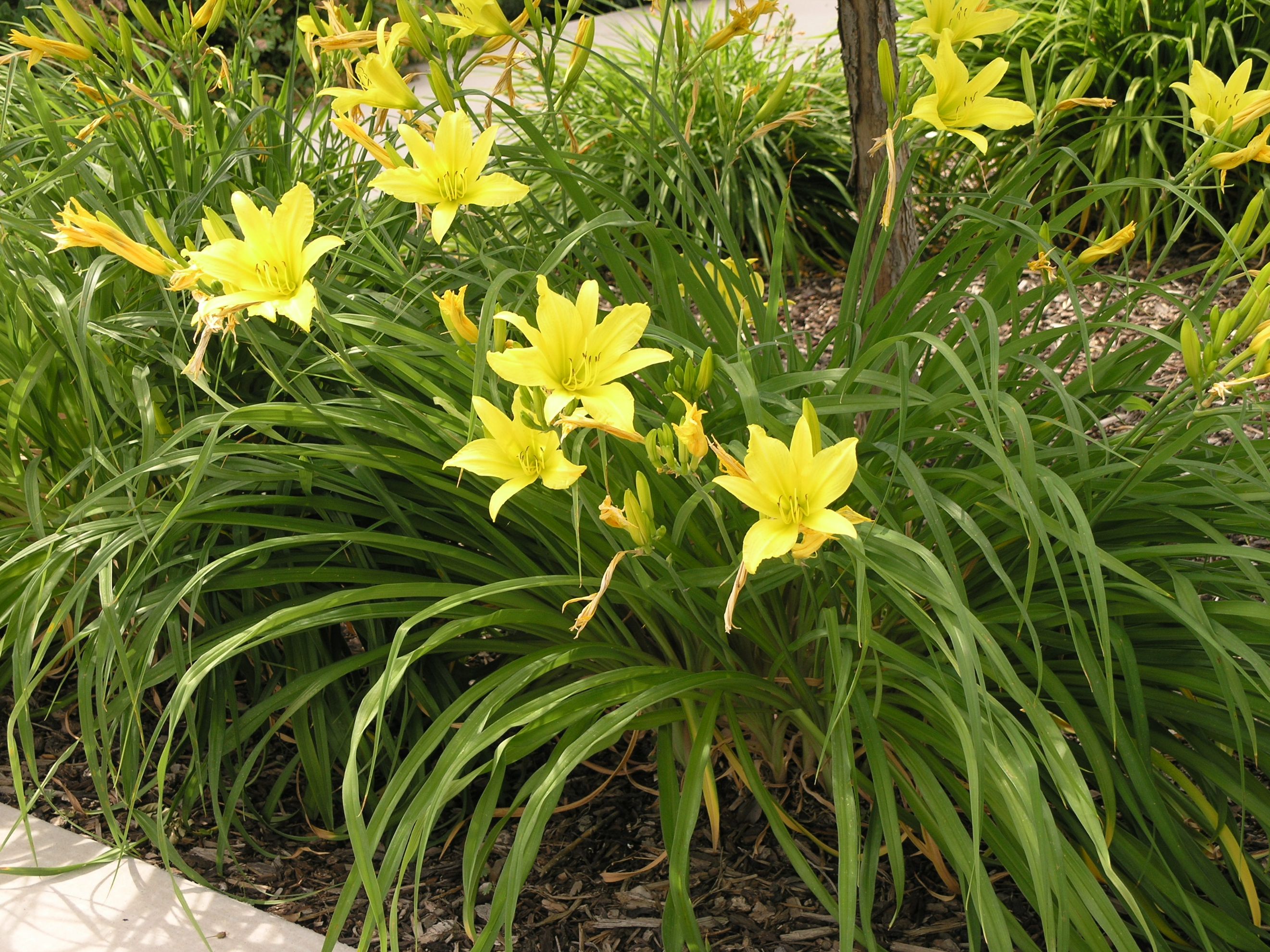
Hyperion Daylily Hemerocallis 'Hyperion'
Tall herbaceous perennial with fragrant bright canary-yellow summer-blooming flowers. Foliage is long and drooping with grasslike blades about 1 inch wide. Easily grown in a wide range of conditions. As suggested by the name, flowers last one day but are produced over a long period of time. Divide every 3-5 years to maintain vigor.
-
Hair Garlic
Bulbous, clump-forming relative of the wild garlic. Red-purple centers are covered with long, twisty hair-like green petals.
Allium vineale 'Hair'
Mature Size: 24-36" tall x 6" wide
-

Hairy Penstemon
A purple flowering penstemon that is adaptable to many environments, making it nearly effortless to grow. It can handle full sun to full shade and thrives in both moist and dry conditions. The subtle hairy texture along the stems sets it apart from other Penstemons and is what led to its name. This perennial hosts bumblebees, hummingbirds and larva for several Checkerspot butterfly species.
Penstemon hirsutus
Mature Size: 12-24" tall x 10-12" wide
-

Hale Haven Dwarf Peach
This high-yielding dwarf peach tree is a hybrid of J.H Hale and South Haven. Bears numerous pink flowers in spring leading to large yellow freestone peaches with red blushed skin. The peaches have firm flesh that resists bruising and is ideal for canning and freezing. Needs 6-8 hours of sunlight daily to ripen. Green lance shaped leaves also provide some ornamental appeal without the fruit. Not tolerant of drought. Self-pollinating.
Prunus persica 'Hale Haven'
Mature Size: 8-10' tall x 6-8' wide
-

Hameln Dwarf Fountain Grass
Dense, clump-forming, perennial grass with foxtail-like inflorescences. Has narrow, mid-green leaves up to half-an-inch wide. Tiny creamy-white flowers are begin blooming in June. Very attractive foxtails last into fall. Prefers full sun. Moderately drought tolerant. Shorter than average species height.
Pennisetum alopecuroides 'Hameln'
Mature Size: 3' tall x 2' wide
-

Hancock Coralberry
Low-growing, spreading shrub with arching branches. Branches do not root where they touch the ground. Pink-white blossoms appear in early summer giving way to pink berries which mature in autumn. Dark green leaves are oval and hairy underneath.
Symphoricarpos x chenaultii 'Hancock'
Mature Size: 1-2.5' tall x 6-8' wide
-
Hardy Geranium
This is a clumping, sprawling herbaceous perennial. It takes little water and does not require much fertilization. Plants will rebloom if cut down to the ground after first blooms have faded.
Geranium spp.
Mature Size: 6-36" tall and wide
-

Harison's Yellow Rose
Suckering shrubby rose also known as the "Yellow Rose of Texas." Mid-green fern-like leaves grow on spiny stems. Spring brings cup-shaped, semi-double, bright yellow fragrant flowers up to 2" in diameter. Can be very aggressive. Plant in well-drained soils. Tolerates alkaline soils and drought.
Rosa x harisonii 'Harison's Yellow'
Mature Size: 6' tall x 4' wide
-

Harlequin Butterfly Bush
Beautiful medium to large shrub flowering shrub. Can be pruned back to desired height each year, even to the ground if desired. Once established, this plant is tolerant of many conditions. Attracts butterflies and bees. In addition to dark red-purple blooms, the leaves of this variety are variegated.
Buddleja davidii 'Harlequin'
Mature Size: 10-12' tall x 8' wide
-

Harriman Yucca
Upright-growing evergreen shrub. Thick, narrow blue-green leaves have sharp tips and should be planted away from high traffic areas. Clusters of cream-colored flowers tinged with purple grow on tall stems above the plants in early summer. Needs no irrigation once established.
Yucca harrimaniae
Mature Size: 2-3' tall and wide
-
Heartleaf Bergenia
Short, clump-forming perennial often grown for its attractive rosettes of large, glossy-green, heart-shaped leaves that turn reddish-bronze in the winter. Dense clusters of small-pink flowers bloom in spring. Tolerates many soil types but needs consistent water to grow well.
Bergenia cordifolia
Mature Size: 12-18" tall and wide
-

Hearts of Gold Redbud
This Redbud will add a lot of interest to any landscape. Early spring brings lavender-purple blossoms that emerge on bare branches. Then, large heart-shaped leaves emerge orange-red, mature to a brilliant golden yellow and gradually fade to a pale, yellowish-green as summer approaches. The unique foliage alone makes this Redbud a perfect specimen plant or informal hedge.
Cercis canadensis 'Hearts of Gold'
Mature Size: 20-25' tall x 25-35' wide
-

Heavenly Blue Bluebeard
Medium deciduous shrub often best treated as a perennial along the Wasatch Front. This plant is marginally hardy and will die to the ground during hard winters, but will easily grow back from its roots. Produces narrow, gray-green leaves with clusters of deep blue flowers. Flowers during the summers.
Caryopteris x clandonensis 'Heavenly Blue'
Mature Size: 2-3' tall and wide
-
Heavy Metal Switch Grass
Clump-forming, warm season, ornamental grass. Long, slender, metallic-blue leaves form a dense columnar clump but may flop in overly fertile soils or too much shade. Fine textured, pink-tinged seed heads appear in fall and provide excellent winter interest if left uncut. May reseed. The species is native from Utah to the east coast.
Panicum virgatum 'Heavy Metal'
Mature Size: 4-5' tall x 1-2' wide
-
Hedge Maple
Medium-sized deciduous tree with highly variable shape. Thin branches grow profusely with 5-lobed leaves that turn bright yellow in the fall. Grows well in dry sites but needs some water to maintain vigor. The common name refers to its tolerance of severe pruning such as hedging. Makes an excellent street tree but prefers some protection from the wind. Requires pruning early on to develop a desirable shape.
Acer campestre
Mature Size: 30-35' tall and wide
-

Helen von Stein Lamb's Ear
Dense, mat-forming woolly gray-green perennial. These semi-evergreen leaves are hairy, soft and resemble the ears of a lamb, hence the name. This cultivar rarely flowers. Can form a dense groundcover. Tolerates some drought and needs well-drained soils. Makes a great addition to rock gardens and works well as an accent plant.
Stachys byzantina 'Helen von Stein'
Mature Size: 12-18" tall x 18-24" wide
-

Helene Rose of Sharon
A vigorous flowering shrub, the hibiscus grows with dense multiple stems. It grows upright and can make a good hedge. Summer brings numerous showy, pure-white, five-petaled flowers with dark red to purple eyes. The coarsely-toothed leaves provide a nice backdrop for the attractive flowers. It is tolerant of heat, drought, and poor soils but prefers fertile soils with moderate amounts of water.
Hibiscus syriacus 'Helene'
Mature Size: 8-10' tall x 6-8' wide
-

Hello Yellow Butterflyweed
This cultivar of butterflyweed, a native relative of milkweed, has attractive flat-topped clusters of bright golden yellow blossoms last throughout the summer. The blooms sit on clumps of upright stems that are covered in narrow tipped leaves. After the blooming period, spindle-shaped seed pods emerge. Butterfly weed is a prominent source of nectar for butterflies, and the foliage is a food source for the larvae of monarch butterflies.
Asclepias tuberosa 'Hello Yellow'
Mature Size: 1.5-3' tall x 1-2' wide
-

Hello Yellow Leopard Lily
Sword-shaped leaves grow in clumps up to 10 inches tall. Yellow lily flowers bloom on stalks above the foliage in mid-summer. Flowers turn to seed pods that open when dried revealing clusters of black seeds that resemble blackberries. The plant is sometimes known as blackberry lily.
Iris domestica 'Hello Yellow'
Mature Size: 12-18" tall x 9-12" wide
-

Helmond Pillar Japanese Barberry
A distinguished shrub with multiple stems that form narrow columns of reddish-purple deciduous foliage. A great choice for screening, small spaces, and anywhere you want a formal-looking natural fence without the pruning required by hedges. Inconspicuous yellow flowers appear in spring, turning to bright red berries that stay on the shrub into winter. Stems have very sharp thorns. Tolerant of many soils and conditions.
Berberis thunbergii f. atropurpurea 'Helmond Pillar'
Mature Size: 4-5' tall x 1-2' wide
-

Henfield Brilliant Sun Rose
Low-growing, shrubby evergreen perennial. Small, silvery green, lance-shaped leaves are downy. Bears profuse red-orange rose-shaped flowers in late-spring to early-summer. Grows well as a groundcover or in rock gardens. Presents a very stunning show when covered with flowers.
Helianthemum 'Henfield Brilliant'
Mature Size: 12" tall x 24" wide
-

Hens and Chicks
Low-growing, mat-forming perennial succulent. Rosettes of thick pointed leaves with bristly margins vary in their coloring intensity of light-green bases and red tips. In winter the leaves develop larger red areas. After flowering, the rosettes will die but are replaced by new offset rosettes. Flowers vary from light pink to red. Plants require excellent drainage and little water. Avoid excessively wet winter soil. Great choice for rock gardens, crevices or well-drained pots.
Sempervivum tectorum
Mature Size: 3-6" tall x 6-18" wide
-

Heritage Oak
This hybrid of Bur Oak and English Oak brings together the best of both species with exceptional vigor. It will grow into a large specimen shade tree with a broad pyramid shape, so make sure to give it plenty of space. The shiny, lobed, dark green leaves are silver underneath and turn golden in the fall. Resistant to mildew and very cold tolerant.
Quercus x macdanielii 'Clemson'
Mature Size: 40-50' tall x 10-15' wide
-

Hetz Midget Arborvitae
A small evergreen shrub with a dense globe shape that requires no hedging. Very tough, adaptable and durable. Perfect for borders, containers, and formal gardens. Somewhat wide range of soil tolerance, but prefers moist, neutral to alkaline, well-drained loams.
Thuja occidentalis 'Hetz Midget'
Mature Size: 3-4' tall x 4-5' wide
-

Hidcote Blue Lavender
A cold-hardy, compact evergreen shrub with value both as an herb for its soothing fragrance and as a beautiful water-wise landscape plant. Fragrant, purple-blue blossoms cover tall, slender stems, giving a colorful effect when planted en masse. These can be harvested in their bud stage and dried for indoor use. The flower spikes sit above compact mounds of attractive gray-green foliage. Perfect for edging paths or tucking into rock gardens. Prefers well-drained soil and full sun but can handle some shade.
Lavandula angustifolia 'Hidcote Blue'
Mature Size: 2-3' tall and wide
-

Hidcote Lavender
Great multi-use plant used as an herb for its soothing fragrance and as a water-wise landscape plant. A compact, bushy shrub with gray-green leaves and a pretty Mediterranean look. The fragrant, bluish purple to blue blossoms form on long stalks in late spring to early summer. These can be harvested in their bud stage and dried for indoor use. Cold-hardy, drought tolerant, and prefers well-drained soil.
Lavandula angustifolia 'Hidcote'
Mature Size: 12-18" tall and wide
-

Hillside Creeper Scots Pine
A unique low-growing cultivar of Scotch Pine with spreading branches that hug the ground. Flaky red-brown to orange bark is very attractive. Clusters of twisted evergreen needles may turn a lighter shade of green in the winter months. An effective statement shrub for hillsides and rock gardens. Grows vigorously and slows with age. Plant in full sun in well-drained soil.
Pinus sylvestris 'Hillside Creeper'
Mature Size: 2' tall x 8' wide
-

Hillspire Eastern Red Cedar
A narrow cone-shaped cultivar of the much larger Eastern Red Cedar. Densely growing, bright-green foliage is the most noteworthy characteristic. Bright blue berries stand out against the foliage in late-summer to fall. Tolerant of a wide range of conditions and soil types.
Juniperus virginiana 'Hillspire'
Mature Size: 15-30' tall x 5-15' wide
-

Himrod Grape
American early ripening grape variety. Inconspicuous fragrant green flowers appear in spring and lead to bunches of white seedless grapes maturing to yellow. To maximize fruit production training, pruning, and regular spraying are required. Consult your local extension agency for specific instructions. Fruit is great for eating and making raisins. Vines do have ornamental value as well. Grow in sheltered area with well drained soils and moderate watering.
Vitis 'Himrod'
Mature Size: 15-20' tall and wide
-

Holly-Leaf Oregon Grape
A broadleaf evergreen shrub native to the pacific Northwest that looks great in every season. Leaves are spiny and turn a purple-red color in the winter. Vibrant yellow flowers in spring are followed by blue berry clusters. Great for mass planting in problematic dry shade sites.
Mahonia aquifolium
Mature Size: 3' tall x 5' wide
-

Honey Trumpet Foxglove
A semi-evergreen perennial with bell-shaped amber and honey colored flowers. The flowers bloom on 2-foot-tall spikes and can last for several weeks. It forms a dark green glossy rosette of leaves at the base. Prefers average conditions including regular deep watering. All foxglove leaves are poisonous to pets and humans.
Digitalis 'Honey Trumpet'
Mature Size: 24" tall and wide
-

Hoop's Blue Spruce
A dense, pyramid-shaped cultivar of Colorado spruce that retains the blue coloring and stiff needles of the species. Though smaller than the species, this variety can still get big, so give it plenty of room. A reliable, drought-tolerant tree to use as a focal point in the perimeter of the landscape.
Picea pungens 'Hoopsii'
Mature Size: 30-50' tall x 15-20' wide
-

Hopflower Oregano
A vigorous trailing herb with cascades of blushing lavender and chartreuse hop-like bracts in late summer. Show off the pendulous blooms by planting it at the edge of a raised bed or rock wall.
Origanum libanoticum
Mature Size: 10-14" tall x 18-24" wide
-

Hopley's Oregano
Erect herbaceous perennial with woody base grown primarily for its ornamental value. Dark green leaves are borne on purple-red stems and though aromatic are not as useful for culinary purposes as O. vulgare. Clusters of pink flowers with dark purple bracts are grown in mid to late-summer and into fall. Grow in well-drained soils. Tolerates heat and drought.
Origanum laevigatum 'Hopleys'
Mature Size: 18-30" tall and wide
-

Horstmann Blue Atlas Cedar
Semi-dwarf evergreen tree with short bluish green needles. Has an irregular, open pyramidal form and is best used as a specimen tree. Trunk stays fairly straight and looks best when branches are left on to the ground. A beautiful evergreen for small spaces.
Cedrus atlantica 'Horstmann'
Mature Size: 8-10' tall x 5-6' wide
-

Hot Rod Switch Grass
This compact, clumping ornamental grass has a beautiful upright form. The foliage starts off blue-green and turns a deep burgundy in the summer. Light, feathery, purple seed heads offer winter interest. The species is native from Utah to the east coast.
Panicum virgatum 'Hot Rod'
Mature Size: 3-4' tall x 2' wide
-

Hot Spot Bronze Garden Mum
A densely mounding perennial Mum that is covered with large flowers in fall. The flowers have orange-red centers and golden outer petals. Brings a colorful, festive atmosphere to the autumn landscape.
Chrysanthemum x morifolium 'Hot Spot Bronze'
Mature Size: 15-20" x 12-24"
-
Hot Summer Coneflower
An upright coneflower with petals that change color as they mature. The flowers emerge as a yellow-orange eventually changing to straight orange and finally red as it matures. The leaves are green and ovate with distinct veins. The flowers are long-lasting and work well as cut flowers.
Echinacea 'Hot Summer'
Mature Size: 18-24" tall x 12-18" wide
-

Hot Wings Tatarian Maple
A smaller selection of the tatarian maple, this spectacular variety sports bright red samaras (the helicopter seeds common to all maples) that brighten the tree all summer long. With its vivid fall color and tolerance of alkaline soils, this is a must-have small tree for Utah landscapes.
Acer tataricum 'GarAnn'
Mature Size: 15-18' tall and wide
-

Huber's Tawny Gold Spreading Yew
Dense, spreading evergreen shrub. This shrub can be used for a hedge, border, or screen. Green needle-like foliage reaches out from the plant as it turns to a golden yellow color. Scarlet ornamental berries pop out from the branches. Great for shady places like underneath tree canopies.
Taxus x media 'Huber's Tawny Gold'
Mature Size: 3-4' tall x 4-6' wide
-

Hughes Juniper
A very low-growing, spreading evergreen shrub, this juniper has silvery blue leaves that are purple-tinged in the winter and more green in the summer. It is useful as a groundcover or mixed with other low-growing shrubs. Once established, it requires very little water to thrive.
Juniperus horizontalis 'Hughes'
Mature Size: 1' tall x 9' wide
-
Hummelo Betony
Cultivar of wood betony with large, green, crinkled leaves with prominent veins and serrated edges. The flowers of this cultivar are small, rosy, two-lipped blooms that are grouped in spiked clusters. Drought tolerant once established.
Stachys officinalis 'Hummelo'
Mature Size: 18-24" tall and wide
-

Husker Red Penstemon
The tall, upright stems of this semi-evergreen perennial show off beautiful maroon-red new foliage that turns dark green tinted with red with age. White pink-tinted flowers turn to a deep purple seed head, which can be left or dead headed. Blooms early to mid summer. Fall turns the leaves into a gradient of apricot and burgundy. Native to the eastern US and requires more water than most other penstemons.
Penstemon digitalis 'Husker Red'
Mature Size: 2-3' tall x 1-2' wide
-

Hyperion Daylily
Tall herbaceous perennial with fragrant bright canary-yellow summer-blooming flowers. Foliage is long and drooping with grasslike blades about 1 inch wide. Easily grown in a wide range of conditions. As suggested by the name, flowers last one day but are produced over a long period of time. Divide every 3-5 years to maintain vigor.
Hemerocallis 'Hyperion'
Mature Size: 2-3' tall x 2' wide